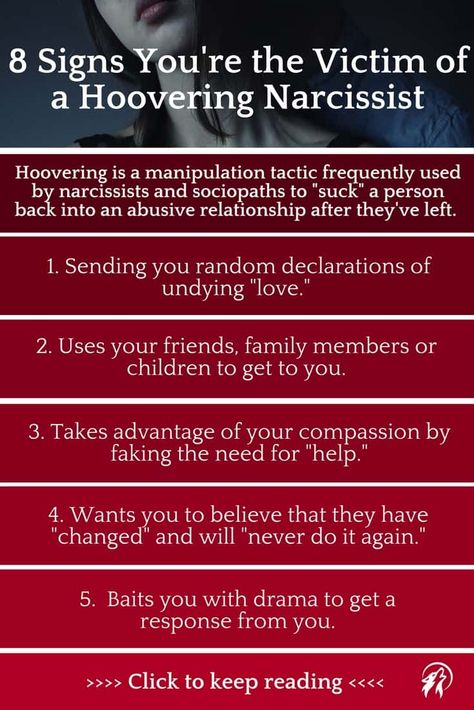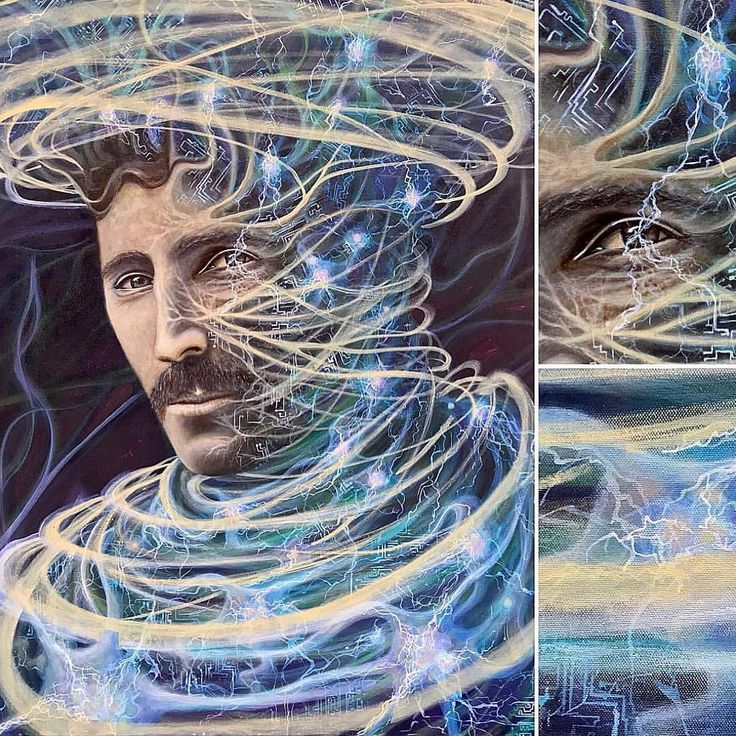Love attachment theory
How Attachment Styles Influence Romantic Relationships
Valentine's Day is a happy occasion for many, a time to show your love or feel loved. But for others, it's anything but. People in search of romance can be lonely, those in troubled relationships may feel even worse. But while finding a lasting love may not be easy, understanding the science of adult attachment could help you find the emotional intimacy you’re looking for.
Relationship attachment styles are a hot topic these days, thanks in large part to the research of Amir Levine, a psychiatrist and neuroscientist at Columbia University. In 2010, he teamed up with longtime friend and psychologist Rachel Heller, who studied at Columbia, to write a book called Attached: The New Science of Adult Attachment and How It Can Help You Find - and Keep – Love (Penguin Press).
The authors popularized attachment theory—the idea that early emotional bonds with our caregivers impacts our future relationships—exploring three distinct attachment styles that affect the way we deal with relationship conflicts, our feelings toward sex, and our expectations of romantic intimacy.
People with anxious attachment styles tend to be insecure about their relationships, fear abandonment, and often seek validation. Those with avoidant styles have a prevailing need to feel loved but are largely emotionally unavailable in their relationships. And a securely attached person is comfortable giving and receiving love, can trust others and be trusted, and gets close to others with relative ease.
While consistently popular with readers, Attached has recently enjoyed a resurgence. Increased social media mentions and renewed interest from the press have sent sales soaring during the past few years.
“I think it’s because many who read Attached experience the scientific content as a revelation, and it’s then hard to resist not to share with others, so they too can be helped by this information,” Levine said.
Columbia Psychiatry News asked Levine how he got the idea for Attached, if we should all aspire to secure attachment styles, and whether couples with different attachment styles are doomed to fail.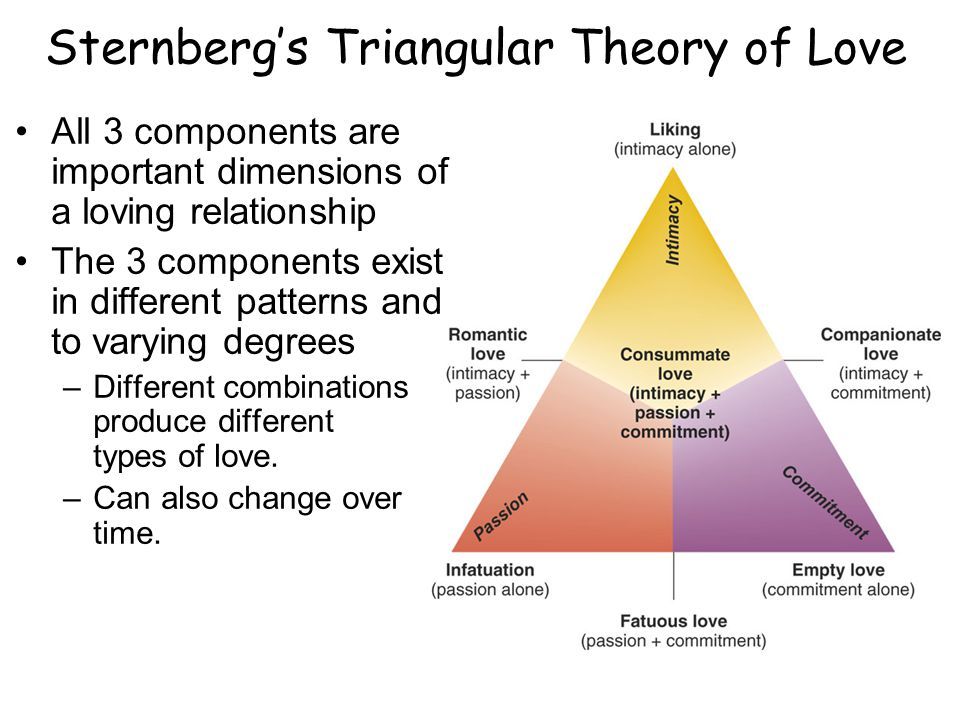
You were working at a therapeutic nursery helping mothers with PTSD bond with their children. When did you realize that this research could also benefit adults engaged in romantic relationships?
I found the work at the therapeutic nursery so meaningful that I read all the suggested material for that rotation, which included textbooks about attachment. In there, I came across the information about adult attachment and attachment styles. At the time, I happened to also be going through a breakup and the information gave me a whole new understanding of what went on in the relationship and what lead to the breakup. Adult attachment theory posits that your attachment style as an adult affects how you behave in close, romantic relationships, and indeed it cast so many things that happened in that breakup in a different light. It was an eye-opening experience.
Do any of the three adult attachment styles (anxious, avoidant, and secure) trend higher with a particular demographic or do they shatter any perceived notions we may have?
People all the time equate avoidance with men and masculinity and anxious styles with women, but that's not true at all.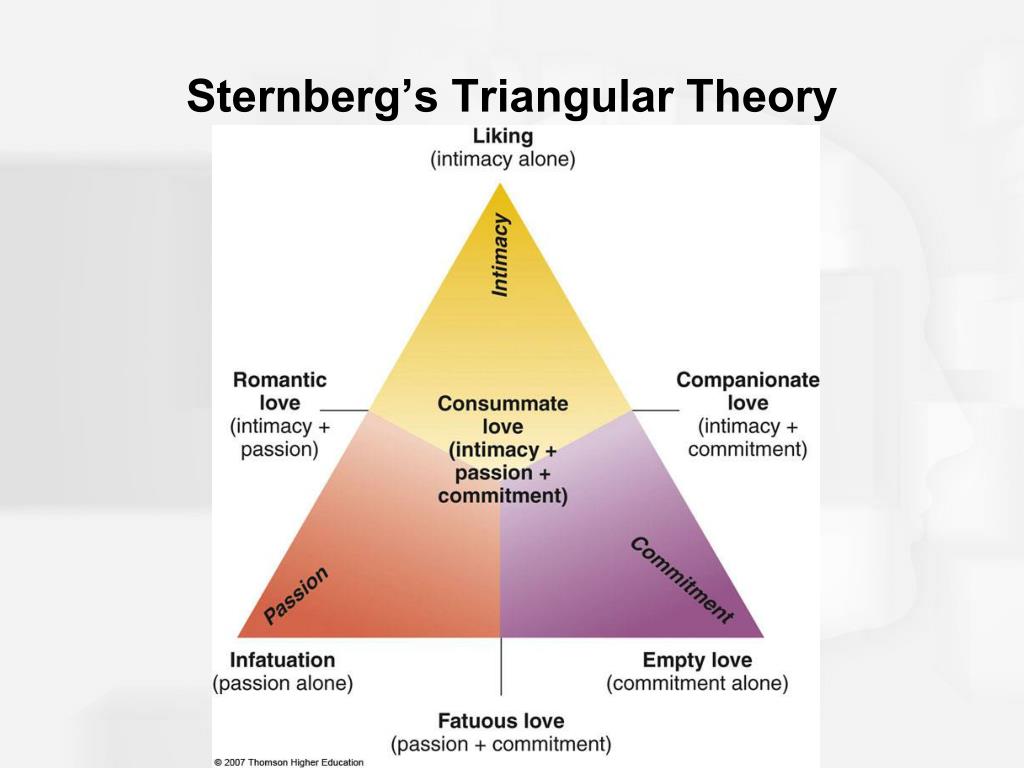 That's why I love science so much, because it helps dispel those types of myths. There are plenty of women who are avoidant and there are men who are anxious. And there a lot of women and men who are secure, which I think is the really good news because secure people can influence insecure people to become more secure.
That's why I love science so much, because it helps dispel those types of myths. There are plenty of women who are avoidant and there are men who are anxious. And there a lot of women and men who are secure, which I think is the really good news because secure people can influence insecure people to become more secure.
Should people with anxious and avoidant styles aspire to become secure?
We can become secure, and I think that’s very promising. That capacity is one of the reasons I chose this field, which allows so much room for change and growth. There's a study that came out recently that shows that simply knowing about one’s attachment style can help people become more secure if they aspire to. It’s not about being healthy or non-healthy from an attachment perspective. It’s more about an effective or ineffective way of being in a relationship, about whether your style is working for you or isn’t.
At what stage in a romantic relationship is it OK to evaluate the attachment style of your partner?
Knowing how you and a romantic partner form attachments can be beneficial in all stages of relationships, and especially in the beginning of a relationship. Think about it as interviewing somebody for probably the most important role of your life, so you want to be in touch with all the cues and listen to see if there’s going to be good compatibility between the two of you.
Think about it as interviewing somebody for probably the most important role of your life, so you want to be in touch with all the cues and listen to see if there’s going to be good compatibility between the two of you.
If you discover your romantic partner has an attachment style that you were not seeking or even trying to avoid, can you salvage the relationship or is it better to move on?
People who have anxious and avoidant attachment styles and get together doesn’t mean they’re not going to love each other; it doesn’t mean they can’t have very happy moments together. But it also means there’s going to be some incompatibility that they’re going to have to deal with. That’s a big part of what I do in my private practice. I try to help people align themselves better.
What impact does the dominance of digital technology—social media, texting, and messenger apps—have on our attachment styles and romantic relationships?
Social media can actually be helpful in relationships because it’s another tool of engaging or connecting or disconnecting.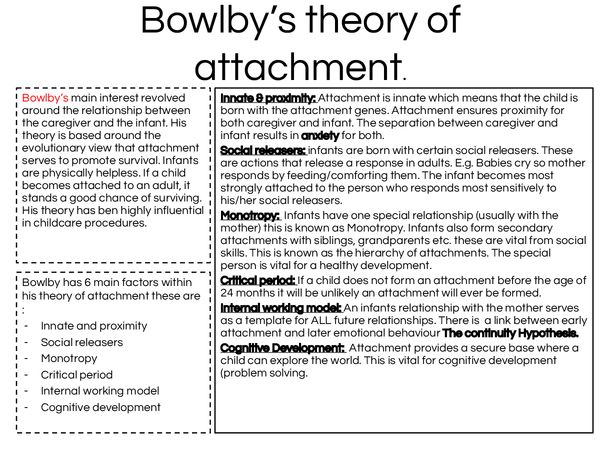 We feel safe through our connections with other people and through their availability. So, if we know how to use texting and social media in a way that helps the other person feel connected to us, we can use it to our advantage. It’s less awkward than before when you would have to call someone on the phone and talk. Now, you can connect in a text very quickly and maintain that connection until the next time you see or talk with them.
We feel safe through our connections with other people and through their availability. So, if we know how to use texting and social media in a way that helps the other person feel connected to us, we can use it to our advantage. It’s less awkward than before when you would have to call someone on the phone and talk. Now, you can connect in a text very quickly and maintain that connection until the next time you see or talk with them.
Love as Attachment | Psychology Today
Source: Wikimedia Commons
How our love is manifested is a function of our attachment style and our personality. Psychologist John Bowlby described attachment as an emotional bond that impacts behavior ‘from the cradle to the grave’. How we bond with caregivers during early childhood affects how we behave in relationships, how in touch we are with our emotions and how much we will allow ourselves to love others on a conscious level. The early attachment processes lead to a particular mental model of relationships that continues to shape our interactions with other people as we mature and that predicts how we will interact with romantic partners.
People with a secure attachment style maintain a healthy proximity to other people. They are not afraid of closeness and intimacy, and they do not depend on it in a pathological way. People with an insecure attachment style, on the other hand, avoid closeness with others or their whole existence depends on it.
Attachment theory was first developed as a theory of how children respond to different parental behaviors and how this response pattern affects their relationships later in life. Bowlby argued that in a healthy environment a bonding process occurs between child and caregiver during the first five to six years of the child’s life. The caregiver is in a position to recognize and satisfy the child’s emotional needs. When adequate attachment between child and caregiver is lacking, the child grows up with an impaired ability to trust that the world is a safe place, and that others will take good care of him or her. Childhood abandonment, unpredictable parental behavior, unrealistic parent expectations, and physical, verbal or emotional abuse teach children that their environment is not a safe place and that the people they encounter cannot be trusted.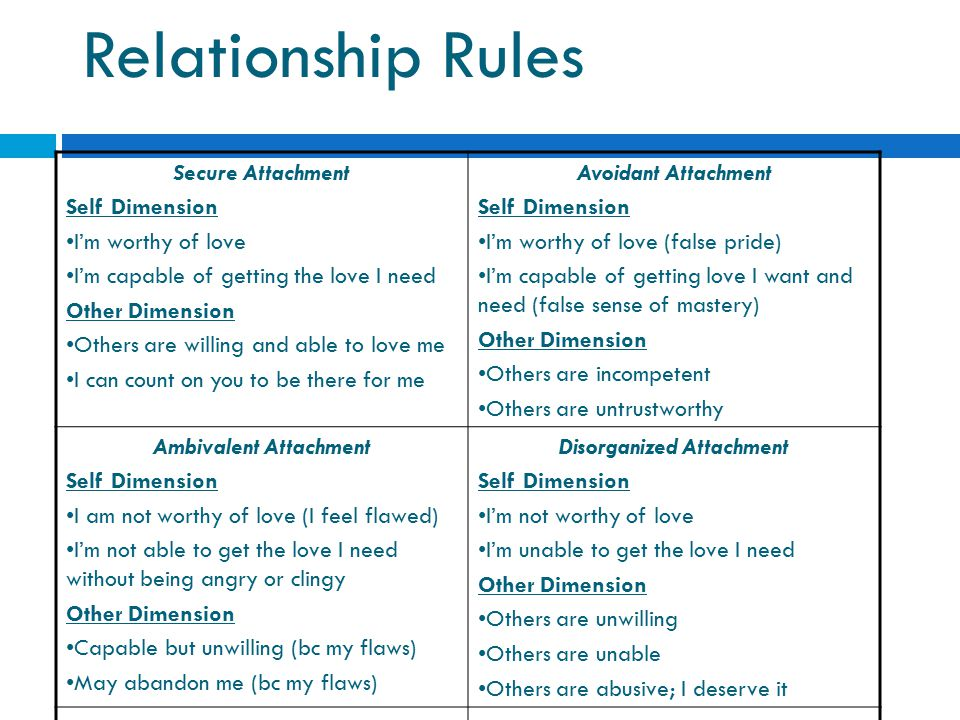
Children who are abandoned, neglected or mistreated will inevitably experiment with different ways of coping with the psychic wounds and lack of security. Whatever is most effective influences what sort of attachment style they develop. One child may restore some kind of equilibrium by continually seeking the caregiver’s attention and approval. Children in this category develop an anxious/preoccupied attachment style--what is also known as a resistant or ambivalent attachment style. If, however, the initial attempts to restore equilibrium do not work, the child will eventually disengage from the external world and retreat into his or her own mind. They will learn that keeping their thoughts and feelings to themselves leads to the least amount of anguish and pain. Children in this category develop an avoidant attachment style.
The anxious/preoccupied attachment style carries with it a ‘a tendency to make excessive demands on others and to be anxious and clingy when they are not met’ (Bowlby 1973: 14).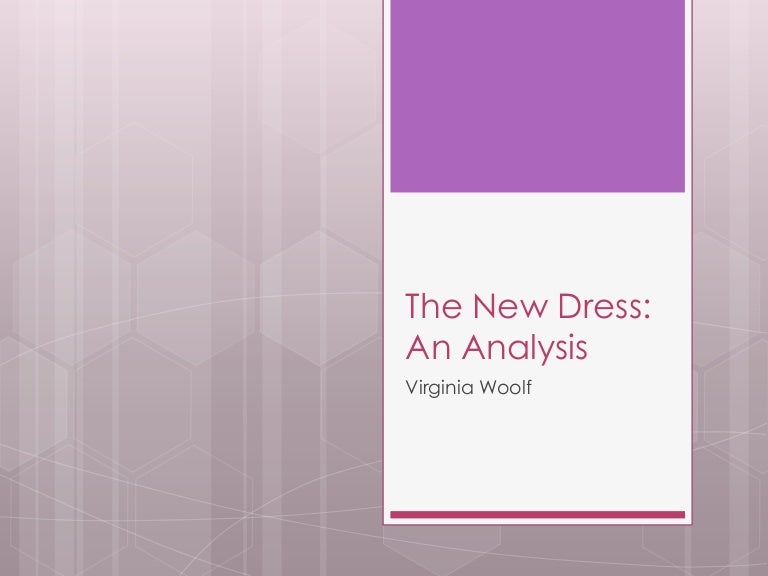 Anxiously attached individuals are anxious about and preoccupied with long-term commitment and the availability of their partners. They may also continually experience an unfulfilled need for mutuality, intimacy and reciprocity regardless of how available and committed their partner is.
Anxiously attached individuals are anxious about and preoccupied with long-term commitment and the availability of their partners. They may also continually experience an unfulfilled need for mutuality, intimacy and reciprocity regardless of how available and committed their partner is.
Anxiously attached people furthermore become very anxious when facing separation and during separation from the partner (Hazan & Shaver, 1987). Yet they tend to behave in paradoxical ways upon reunion with the partner or after their needs are met. Their feeling that the partner abandoned them triggers angry protests directed at the partner or angry withdrawal from the partner when the partner eventually attends to them. A similarly negative response can be seen in connection with relationship conflict, which causes the anxiously attached individual to have a more negative attitude toward the partner and the relationship.
Immature, anxiously attached individuals tend to become compulsive care-seekers, wanting their partner to pamper them and take care of them.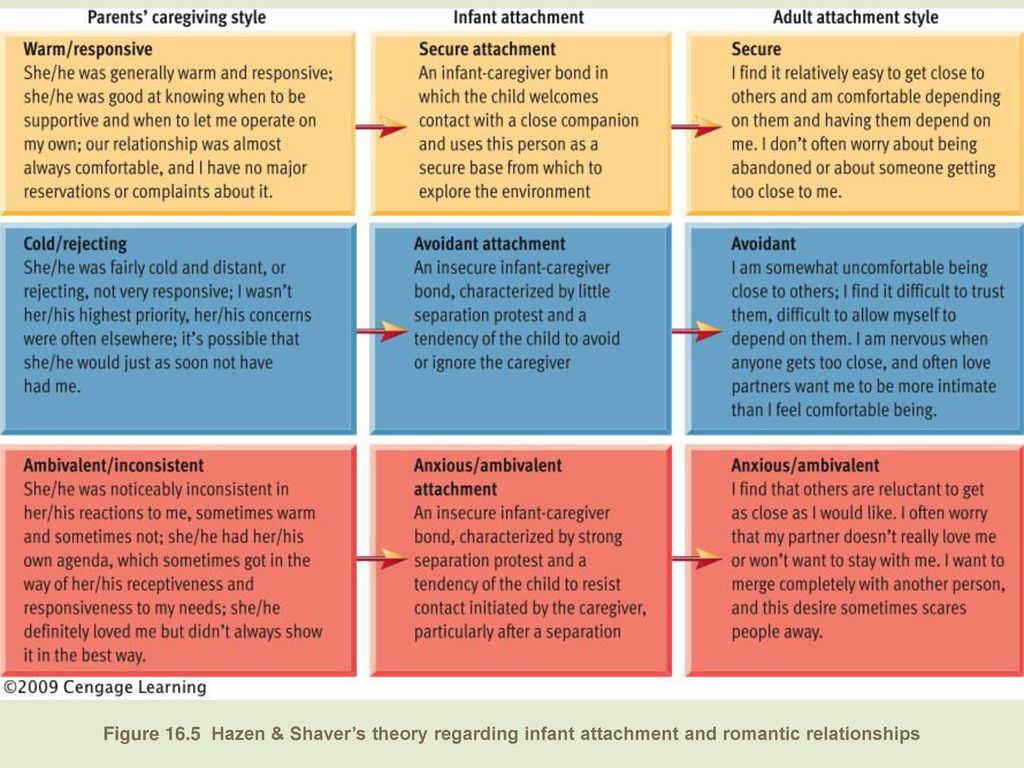 In successful cases where the care-seeker’s excessive needs are taken care of, this results in a unilateral relationship that provides the care-seeker with support, approval and attention without any expectation that he or she will show any concern or care for the caregiver. If the care-seeking goal is frustrated by a person who purposely or inadvertently fails to take care of the care-seeker’s excessive needs, the care-seeker is likely to lash out with angry insults, passive-aggressive behavior or angry withdrawal from the partner until the partner gives him or her undivided attention and fulfillment of his or her needs.
In successful cases where the care-seeker’s excessive needs are taken care of, this results in a unilateral relationship that provides the care-seeker with support, approval and attention without any expectation that he or she will show any concern or care for the caregiver. If the care-seeking goal is frustrated by a person who purposely or inadvertently fails to take care of the care-seeker’s excessive needs, the care-seeker is likely to lash out with angry insults, passive-aggressive behavior or angry withdrawal from the partner until the partner gives him or her undivided attention and fulfillment of his or her needs.
It is often overlooked that a preoccupied-anxiously attached individual can possess narcissistic traits. However, the preoccupied-anxiously attached care-seeker is an excellent example of an extremely narcissistic person. Conversations will tend to be focused mostly on their needs. Like a child, they will willingly participate in activities only when they are convenient and entertaining for them. Excessive care-seeking can be an underlying cause of attention-seeking disorders like hypochondria, histrionic personality disorder and borderline personality disorder.
Excessive care-seeking can be an underlying cause of attention-seeking disorders like hypochondria, histrionic personality disorder and borderline personality disorder.
Whereas immature anxiously attached individuals are obsessively seeking care, more mature, anxiously attached individuals may become compulsive caregivers, seeking attachment by caring excessively for a parent, child or partner. In this scenario, the anxiously attached person assumes the role of the excessively, caregiving "parent" in order to maintain the illusion of true mutuality and unity: the sublime goal of their existence. When a parent assumes this role in his or her relationship to a child, this can turn into a form of constant hovering over the child, also known as helicopter parenting.
The second type of insecure attachment is the avoidant attachment style. People who are avoidantly attached cannot form close romantic relationships (Bowlby, 1973: 14). They experience fear when they need to narrow down options by committing to another person, a job or a course of action.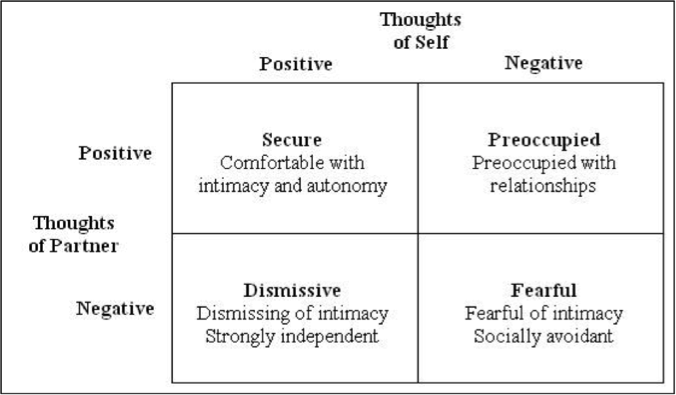 They furthermore show patterns of compulsive self-reliance, refusing to receive from others or give to others.
They furthermore show patterns of compulsive self-reliance, refusing to receive from others or give to others.
Bartholomew & Horowitz (1991) identified two types of avoidant attachment, fearful and dismissive. Whereas the fearfully attached is still hoping to eventually connect with a partner yet fears approaching and connecting and pulls away out of fear, the dismissive avoidant person has given up. They will likely be commitment phobic and use small imperfections in the partner as an excuse for not getting too involved. They may purposely distance themselves from the partner by acting ambivalently, openly flirting with others or cheating, not listening when the partner is talking, not communicating their thoughts or feelings and avoiding intimacy or staying out of touch for days or weeks after an intimate encounter.
The avoidantly attached individual fares slightly better than the anxiously attached individual when faced with relationship conflict. Avoidant people will attempt to avoid conflict, diverting their attention away from the conflict and attachment-related issues.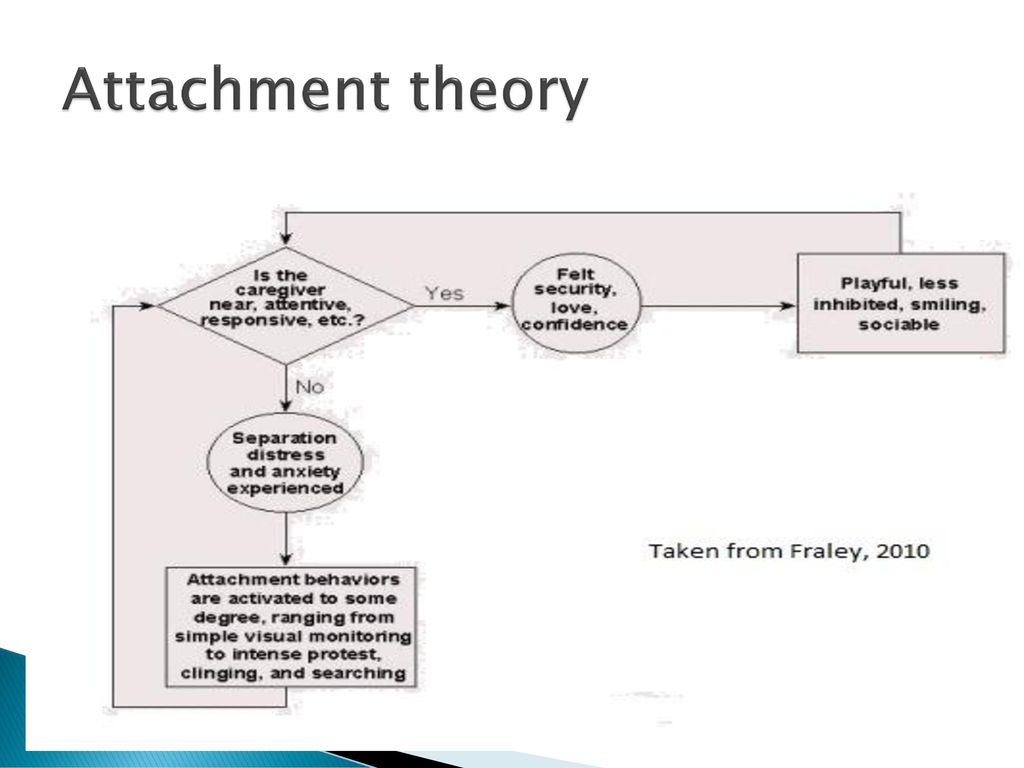 After the conflict, they are likely to behave in less warm and supportive way toward their partner, but unlike their anxious counterpart, they do not view the partner or the relationship in a more negative light.
After the conflict, they are likely to behave in less warm and supportive way toward their partner, but unlike their anxious counterpart, they do not view the partner or the relationship in a more negative light.
Attachment is typically viewed as distinct from love. Shaver and Hazan, however, have argued that love is best understood in terms of feelings of attachment or dispositions to have those feelings (Hazan & Shaver, 1987). Attachment, of course, cannot by itself constitute passionate love. Shaver and Hazan adopt a triangular theory of love. Love, they say, is composed of feelings of or dispositions to feel attachment, a desire to engage in caregiving and feelings of or dispositions to feel sexual attraction.
Although there are three components to passionate secure love, the most basic of the three emotions is the feeling of or disposition to feel attachment. The attachment component can involve a multiplicity of other emotions, for instance, euphoria, joy, affection, security, intimacy, trust, fear, anger, resentment, sadness, emotional pain, disappointment and jealousy.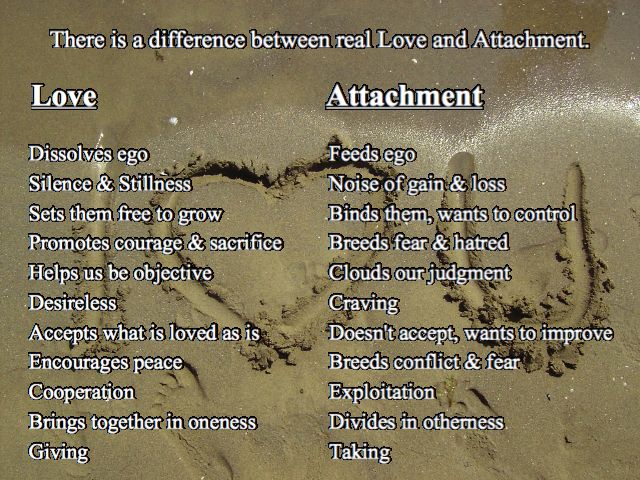 The other two components of passionate, secure love are influenced by the individual’s attachment pattern, which in turns influences how the individual feels about attachment.
The other two components of passionate, secure love are influenced by the individual’s attachment pattern, which in turns influences how the individual feels about attachment.
People who are securely attached tend to be in love relationships that have all three components. Avoidant individuals, by contrast, often do not have the capacity for caregiving. Nor do they show any interest in caregiving. They also fail to associate sexual behavior with intimacy and are more likely to have casual, non-committal sexual relationships than committed relationships.
Anxiously attached individuals score much higher on the caregiving components. They are either compulsive care-seekers or compulsive caregivers or both. Their sexual relationships tend to be a means to satisfy unmet needs for security. They often come across as desperate for love. In their relationships they are likely to be highly jealous and obsessed with their partner as a result of their constant fear of abandonment.
Love understood partially in terms of feelings of attachment has an advantage over numerous other approaches to love. The attachment-theoretical framework forms a unified ‘framework for understanding love, loneliness, and grief at different points in the life cycle’ (Hazan & Shaver, 1987: 511). It furthermore provides a unified account of what distinguishes healthy from unhealthy forms of love. It is noteworthy that the unhealthy forms of love are cases in which the emotions that an individual experiences do not match the object of her love. Compulsive care-seekers, compulsive caregivers and avoidant individuals typically do not have a loving response that matches that of their partners. Compulsive caregivers love too much, whereas compulsive care-seekers and avoidant individuals love too little. So, both kinds of love are unhealthy (or irrational).
The attachment-theoretical framework forms a unified ‘framework for understanding love, loneliness, and grief at different points in the life cycle’ (Hazan & Shaver, 1987: 511). It furthermore provides a unified account of what distinguishes healthy from unhealthy forms of love. It is noteworthy that the unhealthy forms of love are cases in which the emotions that an individual experiences do not match the object of her love. Compulsive care-seekers, compulsive caregivers and avoidant individuals typically do not have a loving response that matches that of their partners. Compulsive caregivers love too much, whereas compulsive care-seekers and avoidant individuals love too little. So, both kinds of love are unhealthy (or irrational).
Moreover, the love experienced by anxiously attached individuals is very often fueled by an idealization of the beloved. So, the love misrepresents and hence is unhealthy (or irrational) for that reason as well. Of course, one can imagine relationships between, say, two avoidant individuals where the loving responses of each partner match the other person’s loving responses perfectly.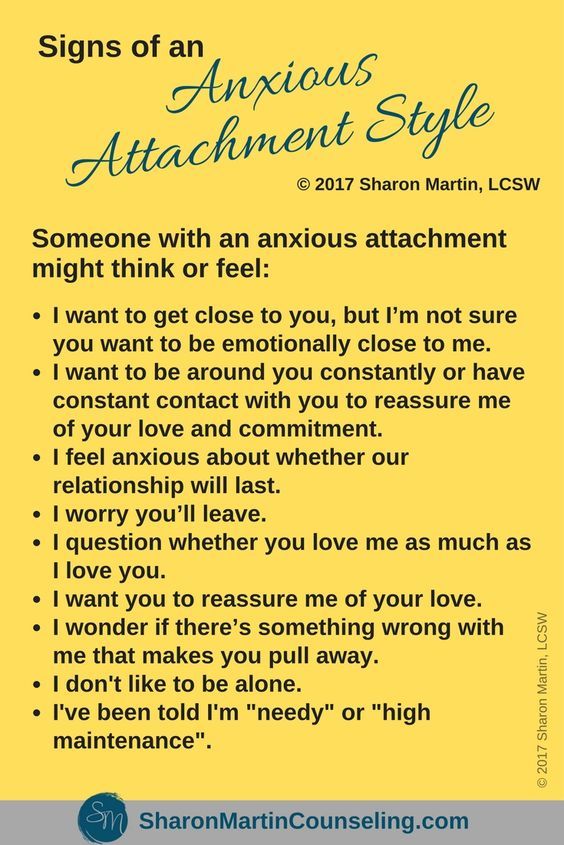 This form of love would not strictly speaking be unhealthy and likely is not distressing to the partners. But such cases are merely hypothetical.
This form of love would not strictly speaking be unhealthy and likely is not distressing to the partners. But such cases are merely hypothetical.
Berit "Brit" Brogaard is the author of On Romantic Love and a co-author of The Superhuman Mind.
Source: Oxford University Press, used with permission
Love and affection - Psychologos
January 01, 2009, 07:38
Film "Invincible"
Film "Private life: the joy of close relationships. Class conducted by Prof. N.I. Kozlov and psychologist Marina Smirnova"
If people are in a close relationship, then over time, affection naturally arises between them. Attachment, as a habit of intimacy and a desire for intimacy, is the natural basis of love. nine0003
Can one exist without the other? Yes, it does, and it's not uncommon. There can be both love without attachment, and attachment without love.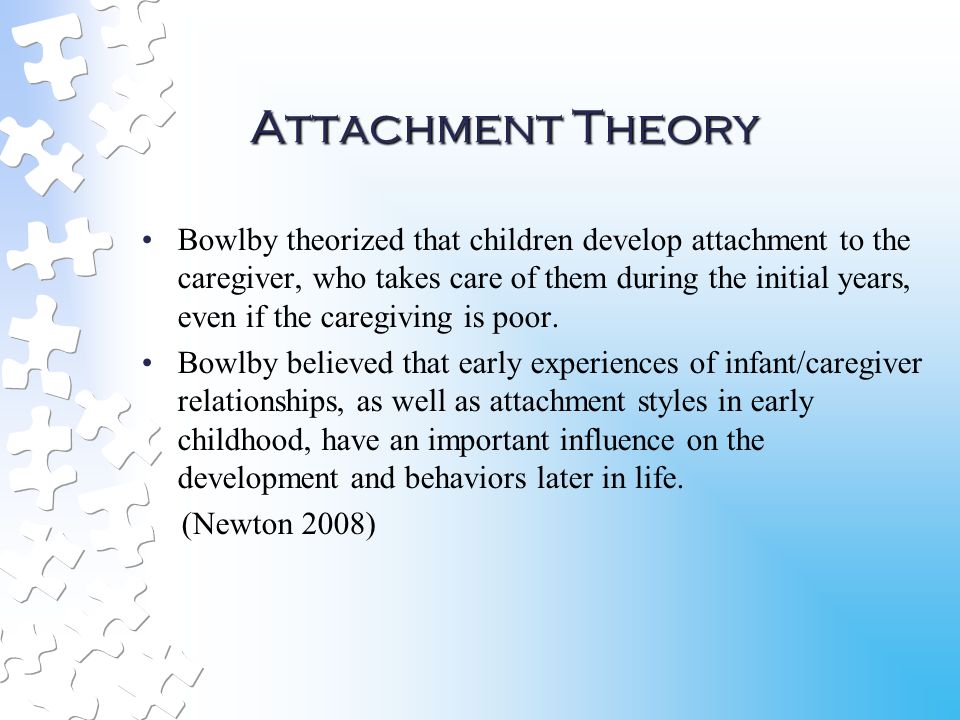
Here is the family. There are constant quarrels, claims, insults and very sincere scenes of jealousy in it. Husband Kostya sometimes drinks, and sometimes beats his wife Lida. But they cannot live without each other, and if Kostya is delayed, Lida is madly worried. And if, God forbid, something happens to Lida, Kostya, it seems, will not survive this ... Divorce is impossible for them, because they have grown into each other and if it happened to get a divorce, they would have to be cut to the quick. "It's hard with him, but I'm so attached to him!" Linda sighs. That's right, it's hard to talk about love here, but affection is obvious. nine0003
But the family is different. Whenever we come to visit them, they are always cozy and sunny: smiles, joy, warmth. Sasha and Tanya are surprisingly attentive to each other - and to the children, and the voice rises there only when they sing songs with the children on family holidays. They really have family parties on Saturdays and they really sing! Idyll.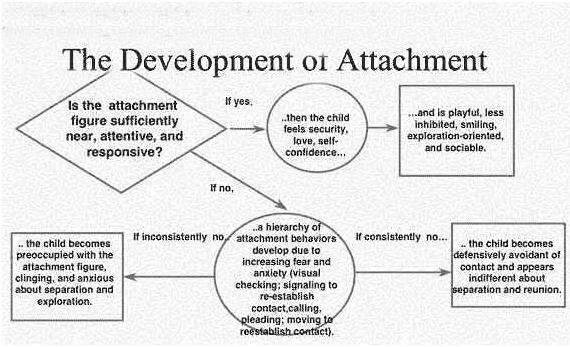 But I also know that Sasha will always be just as bright and calm, even if something happens to Tanya, with the children ... And this is not a mask - this is his soul. He loves both his wife and children, loves them beautifully and sincerely, but without affection. He loves the whole world so. nine0003
But I also know that Sasha will always be just as bright and calm, even if something happens to Tanya, with the children ... And this is not a mask - this is his soul. He loves both his wife and children, loves them beautifully and sincerely, but without affection. He loves the whole world so. nine0003
Of course, we are talking here about Love with a capital letter, about giving love, the content of which is disinterested and joyful care.
Love and affection are not the same thing, but in life love and affection are easily confused. For one person, we can have both at the same time. In addition, we are dependent on the one to whom we are attached, and therefore, being afraid of losing him, we are forced to take care of him. We behave almost like lovers: we carefully listen to the needs of the beloved and give in in case of disagreement - we do everything so that they do not get angry with us and do not move away from us. And then attachment turns out to be very similar to love, only in a voluntary-compulsory version.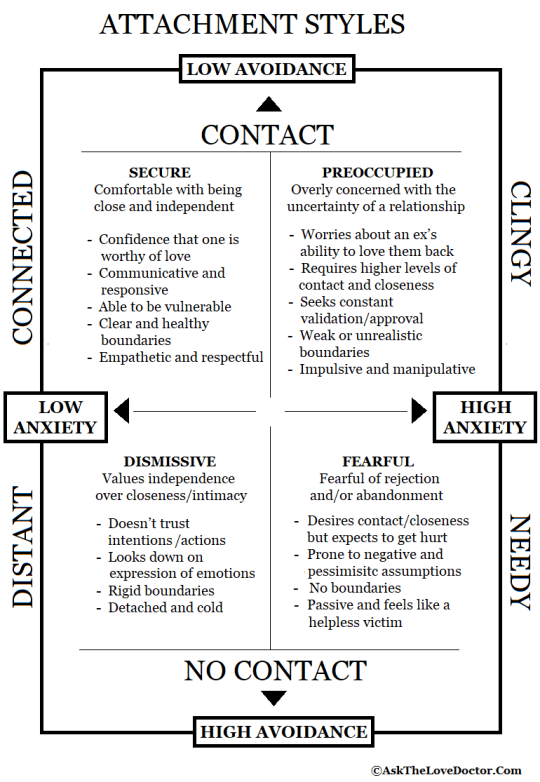 That is why they are so often confused: they talk about Love, meaning only Affection, and sing Affection, dreaming about Love. nine0003
That is why they are so often confused: they talk about Love, meaning only Affection, and sing Affection, dreaming about Love. nine0003
How to tell one from the other? There is a simple criterion that distinguishes Love from Attachment. That criterion is pain: the pain of losing the Beloved. And the fear that this might happen. The result is a constant tension. Attachment differs from love in pain, tension, and fear. Love attachment easily turns into a sick attachment, and even dependence on the object of love. The main feature of love affection is not joy and not care associated with the object of love, but love suffering, with which a person is sometimes tormented, and when he revels with voluptuousness. nine0003
However, attachment is not always a bad thing. Smart people themselves are happy to become attached to what will support them in life, as well as to those people with whom communication is joyful or useful. At the same time, when tying themselves, they prefer not rigid, but conditional attachment, arranged like a carbine for climbers: when necessary, we are securely tied. If a halt and it is better to be free, the carbine snaps off and we are free. The more a person lives at the level of a human organism, the more often and easier he (she) becomes attached thoughtlessly, often to very strange and difficult people, and cannot get rid of these attachments. A person-personality with a developed mind and will allows only those attachments in his life that are useful, and stops unnecessary attachments. nine0003
If a halt and it is better to be free, the carbine snaps off and we are free. The more a person lives at the level of a human organism, the more often and easier he (she) becomes attached thoughtlessly, often to very strange and difficult people, and cannot get rid of these attachments. A person-personality with a developed mind and will allows only those attachments in his life that are useful, and stops unnecessary attachments. nine0003
Attachments are good as long as you need each other and your attachments are not sick, soft, rather playful. If in a relationship your partner shows a tough, painful attachment to you, then this situation is dangerous. How to prevent such relationships and how to behave when not the most adequate people become attached to you, see Prevention of sick attachments.
Returning to the fear of losing a loved one - why is it bad? Living with fear is always bad. Afraid of being alone, the girls agree to relationships with people who should not be contacted.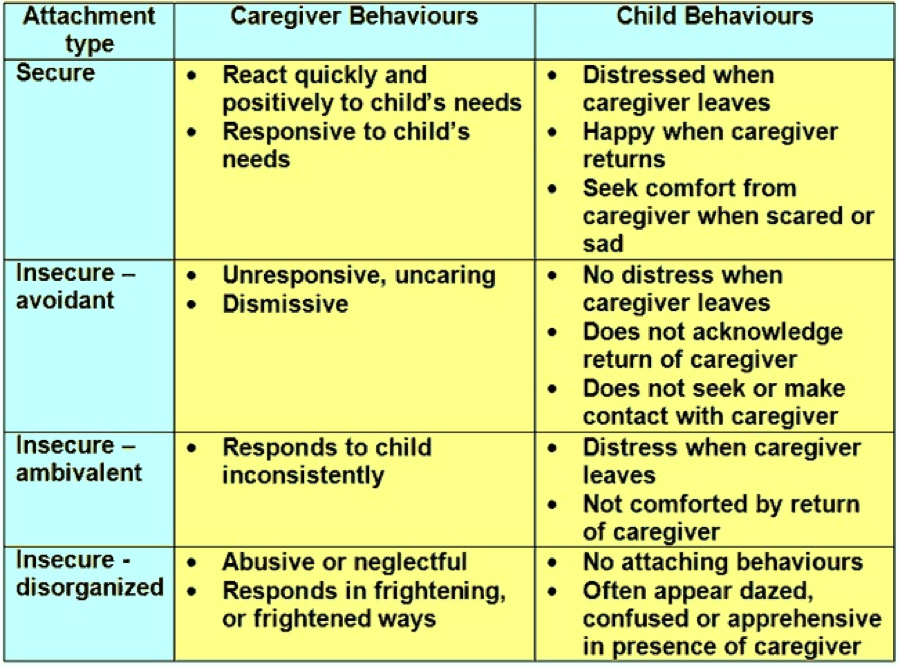 Fearing to lose a loved one, so that the man does not leave, women allow him disrespect for her, rudeness and alcoholism. Fear turns off brains, makes a person short-sighted, pushes them to decisions that lie on the surface, and prevents them from thinking about long-term consequences: fear is not up to them ... Relationships are built more sensibly and stronger for those women who are not afraid to be left alone, who speak calmly and confidently for a man, those moments that are important to her, follow the format and do not allow a man what is unacceptable. Will such a woman love, will she cherish her beloved? If her man is a decent and worthy man, he is a loving husband and a caring father, and it is difficult to find another - a reasonable woman will take care of him as if he were the most precious jewel. And if she also knows how to love, she will devote her life to him, thanking fate every day for such a wonderful gift. Wise people know that sooner or later everyone breaks up: someone is divorced by life, someone by death.
Fearing to lose a loved one, so that the man does not leave, women allow him disrespect for her, rudeness and alcoholism. Fear turns off brains, makes a person short-sighted, pushes them to decisions that lie on the surface, and prevents them from thinking about long-term consequences: fear is not up to them ... Relationships are built more sensibly and stronger for those women who are not afraid to be left alone, who speak calmly and confidently for a man, those moments that are important to her, follow the format and do not allow a man what is unacceptable. Will such a woman love, will she cherish her beloved? If her man is a decent and worthy man, he is a loving husband and a caring father, and it is difficult to find another - a reasonable woman will take care of him as if he were the most precious jewel. And if she also knows how to love, she will devote her life to him, thanking fate every day for such a wonderful gift. Wise people know that sooner or later everyone breaks up: someone is divorced by life, someone by death.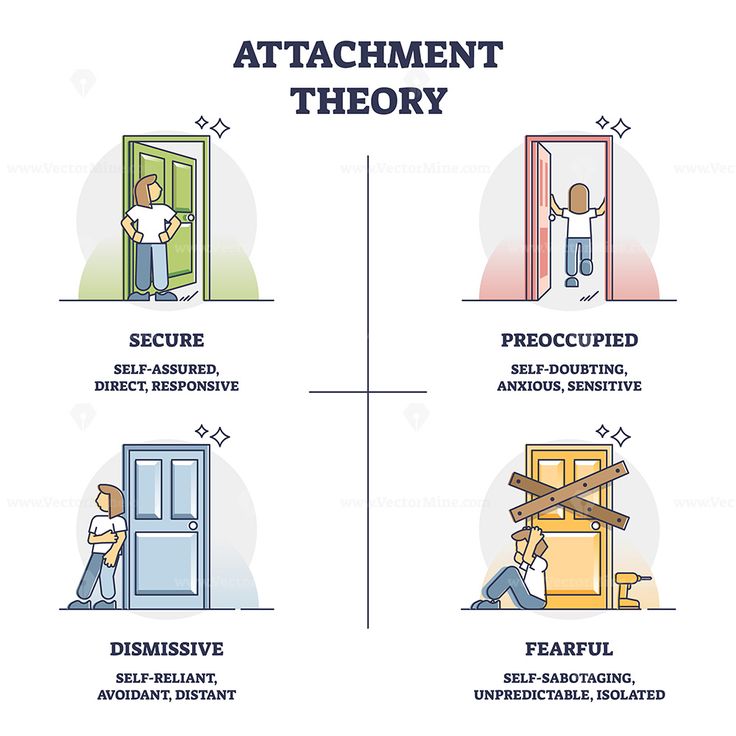 Those who lived in love, not affection, are not afraid of death and parting: they have the memory of the beautiful that was, and the opportunity to do something more beautiful for those who are still with him. This is not indifference, but high wisdom: while we are alive, those who are close to us need us. nine0003
Those who lived in love, not affection, are not afraid of death and parting: they have the memory of the beautiful that was, and the opportunity to do something more beautiful for those who are still with him. This is not indifference, but high wisdom: while we are alive, those who are close to us need us. nine0003
Video from Yana Schastie: interview with professor of psychology N.I. Kozlov
Topics of conversation: What kind of woman do you need to be in order to successfully marry? How many times do men get married? Why are there so few normal men? Childfree. Parenting. What is love? A story that couldn't be better. Paying for the opportunity to be close to a beautiful woman.
- Love
- Attachment
- Love, husband-wife
- Author N.
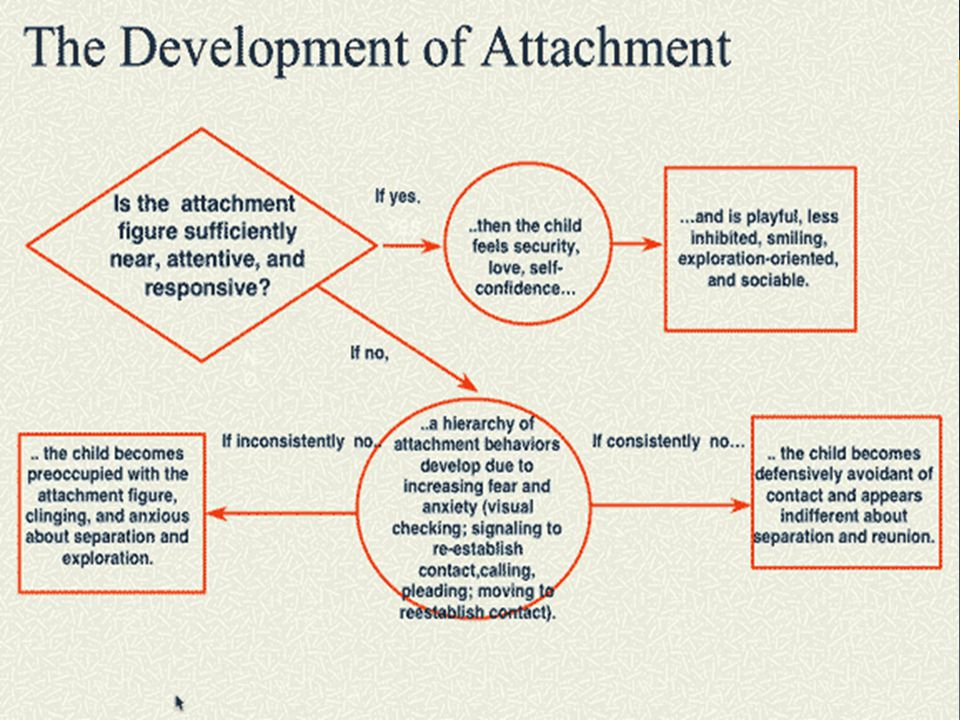 I. Kozlov
I. Kozlov - Love, m-f, family
Comments (29):
Guest, March 28, 2014, 5:14 pm
Please explain if a person loves and WANTS TO BE TOGETHER with another person, is it not the fear of losing is equated with NOT WISHING TO LOSE IT. I understood the article in such a way that the loss of a loved one should not be afraid at all, and if you are afraid, then you do not love. This is absurd. Doesn't that sound like indifference? Explain, I really love this site and I want to understand.
2
response
Kozlov Nikolai Ivanovich, June 05, 2017, 07:32 am
I love Marina very much and do everything so that we can always be together. But if something happens and I lose Marina, I am ready for this and I have no fears about this. It will be just another, new life. Marina treats a similar situation in the same way. We do not live in fear. We live in love.
1
reply
Guest, August 10, 2018 at 00:05 am
I really don't understand: what is the difference between love and affection? If I love a person, then it will hurt me to lose him. But I am an adequate person, and I do not live in fear that this can happen, however, I worry about him, and I will suffer if something happens to him. nine0003
But I am an adequate person, and I do not live in fear that this can happen, however, I worry about him, and I will suffer if something happens to him. nine0003
Guest, March 29, 2020, 11:44 pm
You can't be jealous. My mother told me so when I was a child. She always let dad go to the bathhouse with friends, etc. And they lived together all their lives. But something else happens. The relationship is over and you are attached. You are suffering, but the person doesn't care. Why is affection necessary in love? As long as you are with him, you are fine. If he leaves you, you will be fine too, because you will get out. You are the mistress of your life and happiness is in your hands, and it does not depend on the presence of a particular man in your life. nine0003
Dmitry, February 18, 2015, 8:31 pm
If you are asked: "Do you want to part with your loved one?" You say: "No!" This is quite a UNWANTING TO LOSE IT. And if every day you yourself are like that and you ask him this question with torment and fear, then it will, apparently, be FEAR OF LOSSING IT.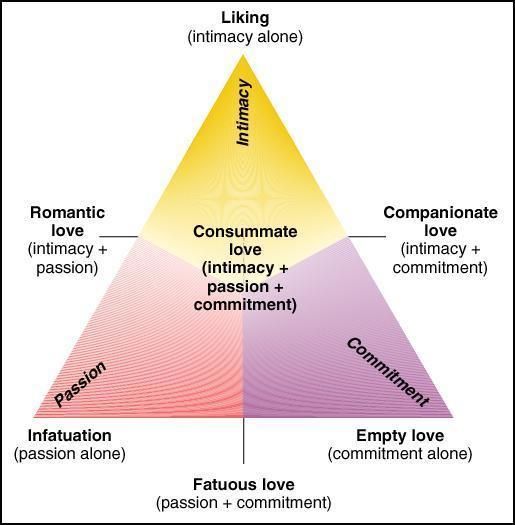 In my opinion, the difference here is like between warm water and boiling water, which burns.
In my opinion, the difference here is like between warm water and boiling water, which burns.
Guest, June 05, 2017, 07:13
What does it mean if a guy broke up, saying that he no longer loves, although he is very attached? nine0003
1
reply
Kozlov Nikolai Ivanovich, June 05, 2017, 07:29
This means one thing: the guy broke up with you. And whether he is attached to you or not, like other questions about him, they no longer make sense. Because he already broke up with you and he is no more. Everything. Win new guys!
Guest, June 22, 2017, 11:36 am
Absolutely disagree with the author about the fact that in love you are not afraid to lose a person. And you are afraid and worried just like with attachment. The only difference is that when you love you want to spend time with your loved one, have common interests, communicate and discuss something with him. and when the habit is just happy that the person is nearby. You can sit all day in different corners and be silent and everything will suit you. nine0003
You can sit all day in different corners and be silent and everything will suit you. nine0003
3
answers
Kozlov Nikolai Ivanovich, June 22, 2017, 16:10
Why are you so categorical? You are right, but you are considering (on the table) option A: Love and affection at the same time. And option B - Love without attachment, and these people live differently. Think, think, think. I understood from the article that if you are afraid of losing a person, then this is attachment? So right? But there is option A - love + affection. This means that I can be afraid of losing a person, but at the same time LOVE him, right? nine0003
Guest, August 27, 2019, 5:46 pm
Absolutely agree with you.
Guest, June 02, 2020, 13:31
Support!!! July 24, 2017 Frequent partings, but we always return to each other, in private he is very gentle, kisses, hugs, in general, anyone would believe that this is love.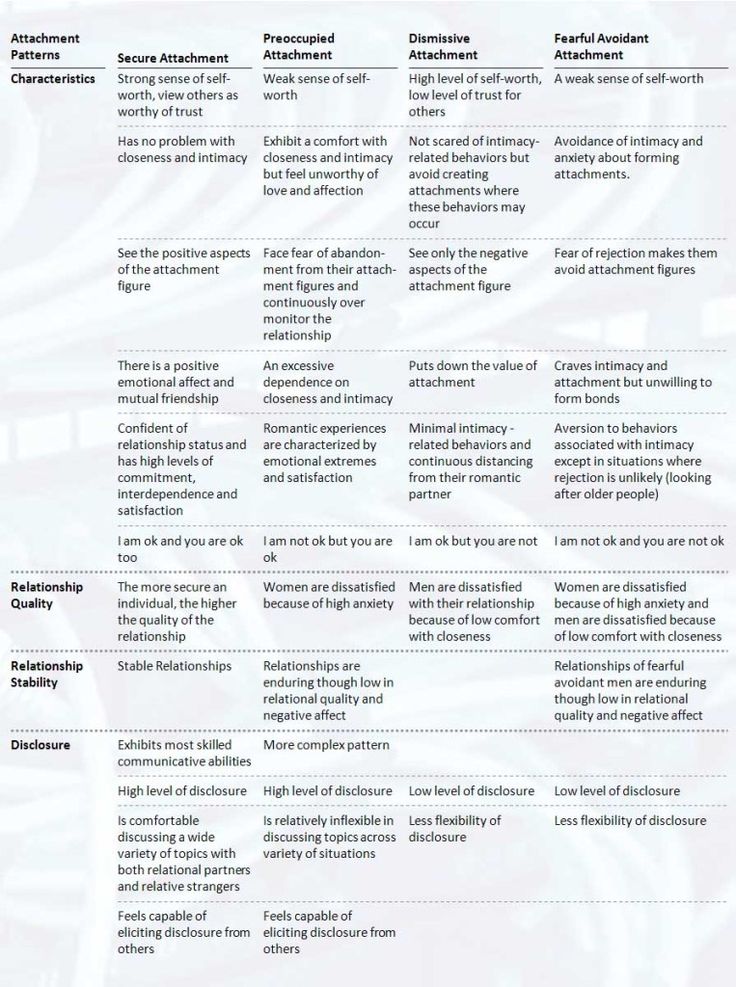 But he says he has affection for me, nothing more. And I love him. nine0003
But he says he has affection for me, nothing more. And I love him. nine0003
2
replies
Guest, July 27, 2018, 3:25 pm
From his side, this is affection, he told the truth.
Guest, June 26, 2019 at 12:37 pm
This is not attachment, but attraction. Attachment is when you miss a person and all the time at a distance you feel like you want to return. Probably, in fact, it is we who miss the feelings that we experience next to our loved one. You can love without strong attachment. For example, I love my mother. But I don't feel sad when I'm not with her. In general, I don’t meet with her often, and I don’t feel sad about it, that is. there is no particular attachment. But I love her. But as a child, without a mother, I was ready to roar with crocodile tears - there was the strongest attachment. Affection almost always accompanies love. Therefore, when our loved ones disappear from our lives or die, we feel bad and want to cry.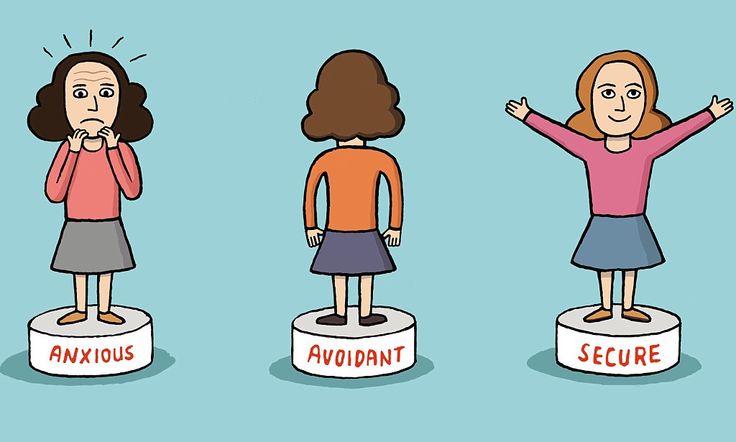 This is fine. Love for a person is a feeling that causes a desire to take care of another - to do well to another. And when you sincerely love, you understand that your loved one can retire and not feel such a strong affection as you. And so, as a wise and loving person, you will say you are bored, BUT you will cry in solitude and NEVER blame the other for not being around because you feel like it. As a loving person, you understand that others may not want the same and respect the wishes of everyone. And if you are attached, but do not love? Then, when parting / moving away, you will only blame that person for your uncomfortable feelings of sadness. In general, a wise and loving person does not hold by force and accusations, but simply loves and lovingly lets go, and if necessary, will survive his sadness (if possible) alone (alone) and cry alone (alone) to survive all the pain and let it go too. NOT a loving person, but with affection, yelling, roaring in front of people, blaming, etc.
This is fine. Love for a person is a feeling that causes a desire to take care of another - to do well to another. And when you sincerely love, you understand that your loved one can retire and not feel such a strong affection as you. And so, as a wise and loving person, you will say you are bored, BUT you will cry in solitude and NEVER blame the other for not being around because you feel like it. As a loving person, you understand that others may not want the same and respect the wishes of everyone. And if you are attached, but do not love? Then, when parting / moving away, you will only blame that person for your uncomfortable feelings of sadness. In general, a wise and loving person does not hold by force and accusations, but simply loves and lovingly lets go, and if necessary, will survive his sadness (if possible) alone (alone) and cry alone (alone) to survive all the pain and let it go too. NOT a loving person, but with affection, yelling, roaring in front of people, blaming, etc.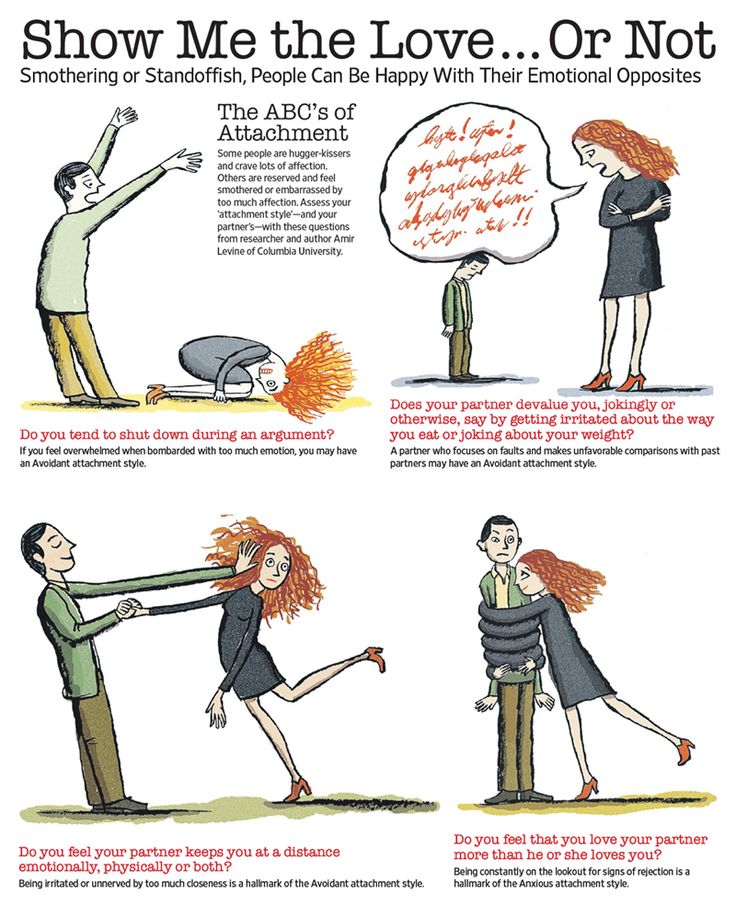 when parting. - that is, he manipulates his sadness and tears. nine0003
when parting. - that is, he manipulates his sadness and tears. nine0003
Guest, September 20, 2017, 8:15 PM
Please help me figure it out. Me and my boyfriend have been together for 2 years. At first, for about a year, we had true love, but at this moment we are wondering if this is love or affection. We cannot live without each other; we have a need for each other, we want to talk, take a walk and tell our news, impressions. And when we quarrel a lot, we know for sure that everything will be fine and at least we will be together. Help me please. Thank you in advance! nine0003
Guest, March 04, 2018, 20:12
Please tell me if I really like a guy, we have a lot in common and similar views on things, when we communicate I feel that we are on the same wavelength, but I am nothing special I don’t feel for him, when we communicate, the heart doesn’t start beating faster and the like, I don’t feel love. I wanted to ask what this means, can love come out of this or is it just friendship? What if he proposes to meet?
1
answer
Kozlov Nikolay Ivanovich, March 11, 2018, 18:25
Read the article "You can" ?%3E">Is it possible to create love without falling in love" - and if the guy is good, then be sure to date!
Guest, May 23, 2018, 02:51 AM
Please reply.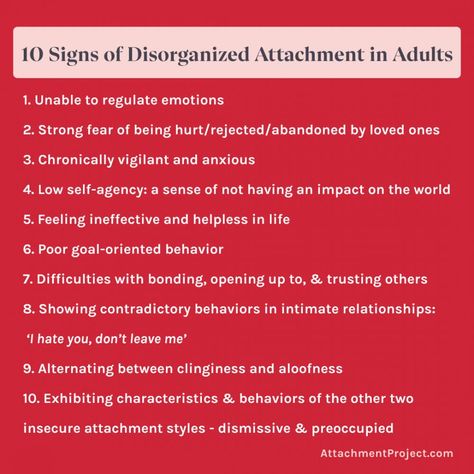 We broke up with my martyr, were together for 4 years, lived together for 1 year. Throughout the relationship, he deceived me in small things, but I did not notice. After two years of relationship, I realized this and we broke up for three weeks. I left for another city, changed activities, and he came to me and everything started spinning again. After 5 months, I found out that he talked with the Girl and met, and deleted correspondence. The answer was to him that it was just communication, and the fact that he confessed his sympathy to her was a joke. Before I knew it, I had already gone with him to my hometown to live together. I got upset and left again, to another area. I talked with the boy, I almost fell in love, but after 1.5 months he took me again and we began to live together. Resentment weighed on me. They lived for a year, the relationship collapsed, he left home. We decided to get a cat. Everything was tense. I always wanted to finish this. But I did not dare, I hoped that everything would be fine.
We broke up with my martyr, were together for 4 years, lived together for 1 year. Throughout the relationship, he deceived me in small things, but I did not notice. After two years of relationship, I realized this and we broke up for three weeks. I left for another city, changed activities, and he came to me and everything started spinning again. After 5 months, I found out that he talked with the Girl and met, and deleted correspondence. The answer was to him that it was just communication, and the fact that he confessed his sympathy to her was a joke. Before I knew it, I had already gone with him to my hometown to live together. I got upset and left again, to another area. I talked with the boy, I almost fell in love, but after 1.5 months he took me again and we began to live together. Resentment weighed on me. They lived for a year, the relationship collapsed, he left home. We decided to get a cat. Everything was tense. I always wanted to finish this. But I did not dare, I hoped that everything would be fine.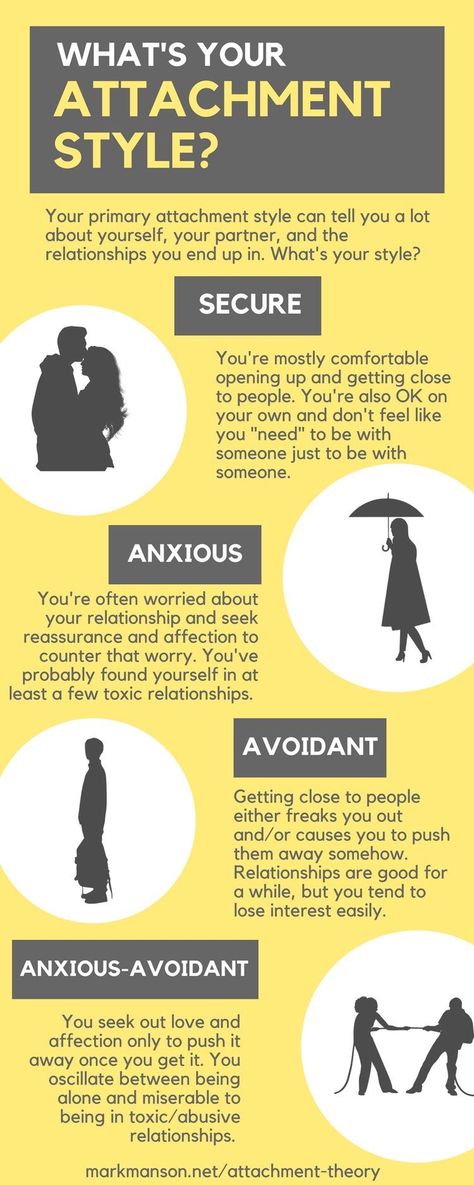 And now he left me and I miss and want to return all these sick relationships. But I know that without them it will be easier. Listen to the head or the heart?! nine0003
And now he left me and I miss and want to return all these sick relationships. But I know that without them it will be easier. Listen to the head or the heart?! nine0003
2
replies
Kozlov Nikolai Ivanovich, May 23, 2018, 09:04
Unfortunately, no matter. You should listen to your head, but this head is stupid, it is no different from a stupid heart... Dependence on a person, sick love will only go away when you start another romance. With these relationships you will put an end to it, even resentment will pass and it will become easier. Most importantly, do not get attached to a new guy if he is not serious. nine0003
Guest, November 13, 2018, 04:25 AM
Hello. We have been dating for the second year (33 and 37 years old). In the past, both had experiences of painful spending and many free years afterward (never married and no children). We agreed on common interests, views and, of course, sympathy and passion. Both were afraid to quickly converge, so as not to burn out. And now we have a lack of passion on his part and a misunderstanding of the situation on my part. For my part, one can say - tender maternal care, that's what it probably looks like, love for a man. He has a habit with me - he is very good with me and he does not want to break up. Both are ready to make efforts for preservation and further development. What can you advise us? We both want the spark back. nine0003
Both were afraid to quickly converge, so as not to burn out. And now we have a lack of passion on his part and a misunderstanding of the situation on my part. For my part, one can say - tender maternal care, that's what it probably looks like, love for a man. He has a habit with me - he is very good with me and he does not want to break up. Both are ready to make efforts for preservation and further development. What can you advise us? We both want the spark back. nine0003
Guest, September 16, 2019, 06:56 PM
This is all great, of course, but it takes years to grow and love yourself, and during that time, relationships develop that you are already in, and therefore process you - have to be in complete loneliness and isolation? Relationships and intimacy are always desirable, even when you are sick.
1
reply
Guest, April 25, 2020, 03:26 PM
Reply not to comment, but to video. The professor is very smart, but a social-humanist-democrat.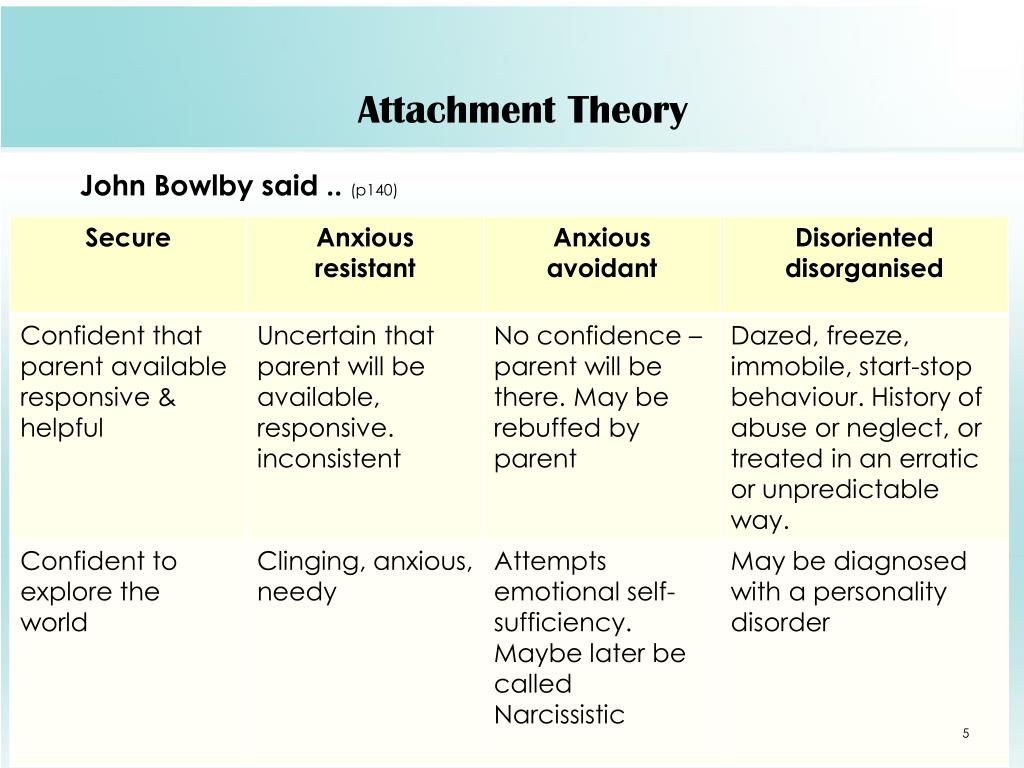 I ask you dear ones and those who suffered from the concepts that systematically introduced you to your misfortune. Everyone will probably agree with the thesis: “A man is a man without a rib. A woman is a rib without a man." Now carefully: "Which dog finds - gnaws." Thesis: “The attachment of a man is reasonable. A woman's affection is natural." What to do, a woman, like a man? Answer: Cultivate qualities in yourself: to be able without pain, reflected on the face and felt in the hostility of the heart, the shortcomings (according to your understanding) visible to you of the person with whom you are in communication. Get this - and you are a diamond for the predominance of which all reasonable people will reach. And one more thing: sincerely wish your loved one and every person to become full-fledged. I will open: Very few high-grade. And most importantly: By yourself, by yourself, become whole... Yes! Yes! A whole person, a person - a person. Theses: “A person's life does not depend on his estate.
I ask you dear ones and those who suffered from the concepts that systematically introduced you to your misfortune. Everyone will probably agree with the thesis: “A man is a man without a rib. A woman is a rib without a man." Now carefully: "Which dog finds - gnaws." Thesis: “The attachment of a man is reasonable. A woman's affection is natural." What to do, a woman, like a man? Answer: Cultivate qualities in yourself: to be able without pain, reflected on the face and felt in the hostility of the heart, the shortcomings (according to your understanding) visible to you of the person with whom you are in communication. Get this - and you are a diamond for the predominance of which all reasonable people will reach. And one more thing: sincerely wish your loved one and every person to become full-fledged. I will open: Very few high-grade. And most importantly: By yourself, by yourself, become whole... Yes! Yes! A whole person, a person - a person. Theses: “A person's life does not depend on his estate.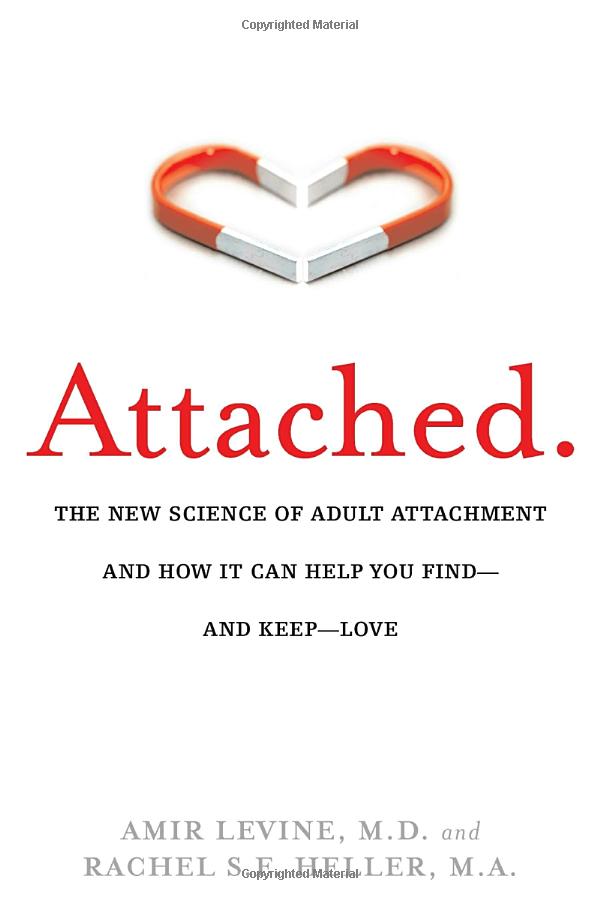 True happiness is in no way connected or communicated with prosperity and fame. It does not contradict them and does not depend on them "point
True happiness is in no way connected or communicated with prosperity and fame. It does not contradict them and does not depend on them "point
Guest, January 15, 2021 4:46 PM
Help. I am 20 years old. Guy 27. We live with him for 2 years, we never quarreled and everything looks perfect, he constantly talks about how he loves me, and I answer the same. About a year ago, depression began to develop in me, at first I ignored my feelings, because next to him I forgot and it seemed that everything was fine, but it was gaining strength every day. I tried to discuss it with the guy, but he couldn't understand me. We rarely discuss matters of the soul, it is impossible with him. When I told him that I felt bad and it was very important that he not be so callous, all he could do was support me with hugs, and then called me an egoist. I felt offended, at that moment I thought for the first time that maybe I was not on my way with this person. He felt it, I saw the fear on his face.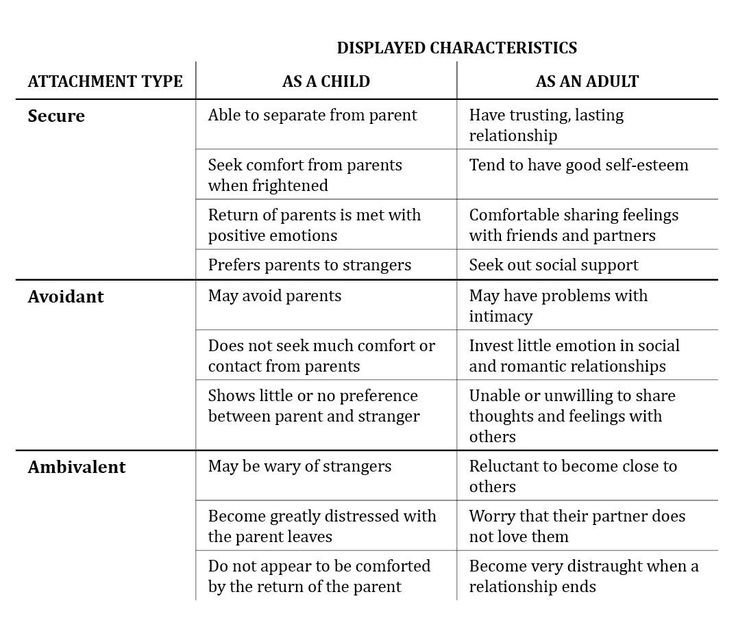 I know that he is madly afraid of losing me, and I am exactly the same. But it’s scary and incomprehensible to imagine the future with him. For all the time he became like a native person, this is my first serious relationship. I feel that I really need a person who loves me, this is a comfort zone from which it is so difficult to get out, but I want to overcome depression, become a self-confident, independent person, I want to grow, develop, meet people. Now I don’t know what to do, I don’t know why this depression, maybe these thoughts are actually delusional, and I need to calm down and stop thinking about breaking up. And if we do break up, suddenly depression will finish me off, but what if this is the only right way out, and only in this way will I get on the right path. nine0003
I know that he is madly afraid of losing me, and I am exactly the same. But it’s scary and incomprehensible to imagine the future with him. For all the time he became like a native person, this is my first serious relationship. I feel that I really need a person who loves me, this is a comfort zone from which it is so difficult to get out, but I want to overcome depression, become a self-confident, independent person, I want to grow, develop, meet people. Now I don’t know what to do, I don’t know why this depression, maybe these thoughts are actually delusional, and I need to calm down and stop thinking about breaking up. And if we do break up, suddenly depression will finish me off, but what if this is the only right way out, and only in this way will I get on the right path. nine0003
2
answers
Sokolova L.V., secretary N.I. Kozlova, January 16, 2021, 09:09
Your question cannot be answered in one word.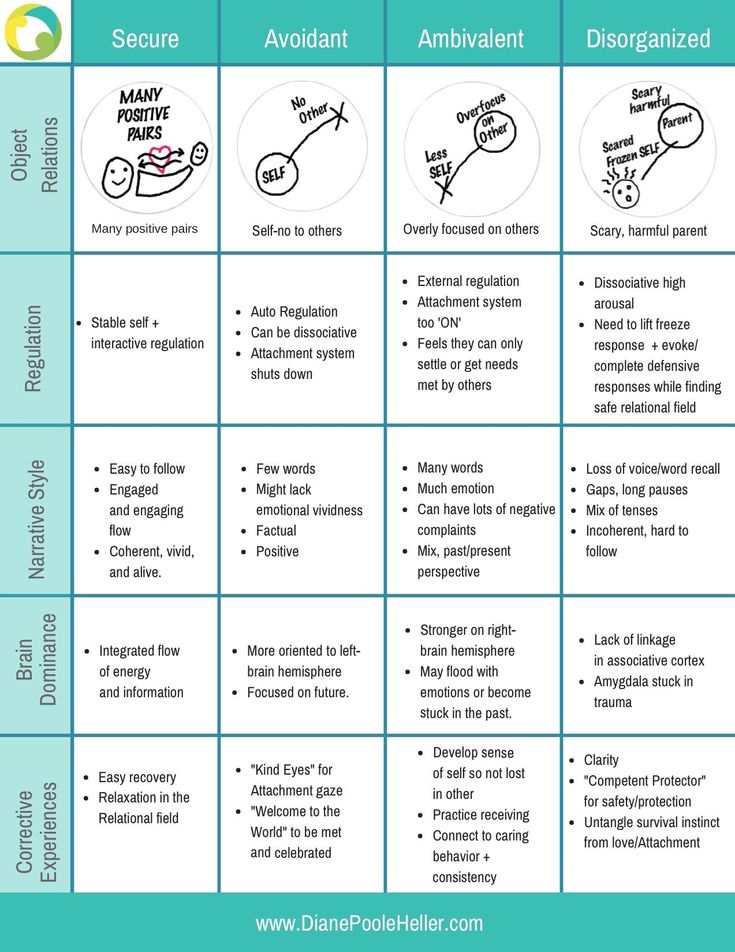 Try to sign up for a free consultation at the University of Practical Psychology https://www.univer-pp.ru/bk/">https://www.univer-pp.ru/bk/">https://www.univer-pp .ru/bk/ You can also go to the Distance https://www.univer-pp.ru/distantsiya,">https://www.univer-pp.ru/distantsiya">https://www.univer- pp.ru/distantsiya, and our manager - Anastasia, contacts: +7 (925) 602-4430 ✉ [email protected] https://vk.com/id8524647
Try to sign up for a free consultation at the University of Practical Psychology https://www.univer-pp.ru/bk/">https://www.univer-pp.ru/bk/">https://www.univer-pp .ru/bk/ You can also go to the Distance https://www.univer-pp.ru/distantsiya,">https://www.univer-pp.ru/distantsiya">https://www.univer- pp.ru/distantsiya, and our manager - Anastasia, contacts: +7 (925) 602-4430 ✉ [email protected] https://vk.com/id8524647
Guest, May 20, 2022, 8:18 PM
Which way is right? 11 February 2021 does he also love other females? For him, it makes little difference what is next to him, and whether there is one at all. He loves a little of everyone. It follows from this that if you love, then everyone is the same. Monogamy, as such, cannot be, and if there is, then this is a deviation. If I'm wrong, please correct me. nine0003
Guest, September 07, 2021 at 12:46 pm
Please help. I am dating a young man. Ideal relationship: incredible support, care, interest in all directions, very strong sensitivity and attentiveness to each other. We spent 3 months together almost every day, of course, reasonably, devoting time to ourselves as well. Now study has begun and there is an opportunity to see each other only 2-3 times a week. I personally understand that you need to develop, gain knowledge and not go completely headlong into a person, seeing only him and that's all in your life. BUT, realizing this, I still miss him very much and cannot do any of my own business, there is no desire to do anything. The desire to take care of himself appears only when he reinforces our relationship with some sweet, pleasant words, or when he understands that I will do my business and I will immediately have the opportunity to meet him. nine0003
We spent 3 months together almost every day, of course, reasonably, devoting time to ourselves as well. Now study has begun and there is an opportunity to see each other only 2-3 times a week. I personally understand that you need to develop, gain knowledge and not go completely headlong into a person, seeing only him and that's all in your life. BUT, realizing this, I still miss him very much and cannot do any of my own business, there is no desire to do anything. The desire to take care of himself appears only when he reinforces our relationship with some sweet, pleasant words, or when he understands that I will do my business and I will immediately have the opportunity to meet him. nine0003
Related materials:
May 11, 2014
How psychological attachment is formed
Attachment is a bond that attracts and keeps a person close to someone or something when no feeling of love binds him to it , no interest or benefit.
11Read more
22 Dec.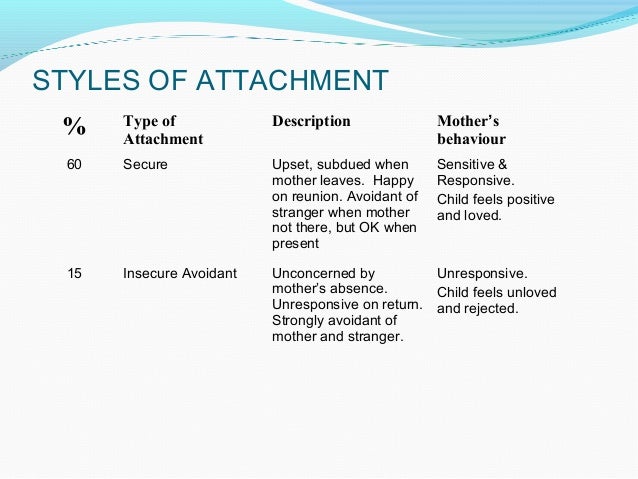 2016
2016
How to motivate clients to get rid of infantilism
"He's mine! Why is he flirting with this... He should only be with me! If only I could tie him up..!" Where does such an attitude towards another person come from? Where does this need for affection come from? Yes, such that the Client wants to physically bind the object of his love and not let go anywhere! And: "Even when he is next to me, he is still not enough for me!" And this is not a small child sitting opposite me in a chair, but an adult girl! No wonder, probably, this association with a child came to my mind. Otherwise, I would not have remembered the psychological model created by E. Bern - transactional analysis. I would not like to go deep into the theory of this model, but I consider it necessary to voice some important postulates. nine0003
1Read more
Jan 06 2013
Love of a man and a woman
In ordinary life, love is not often encountered, and what is found does not look like high love.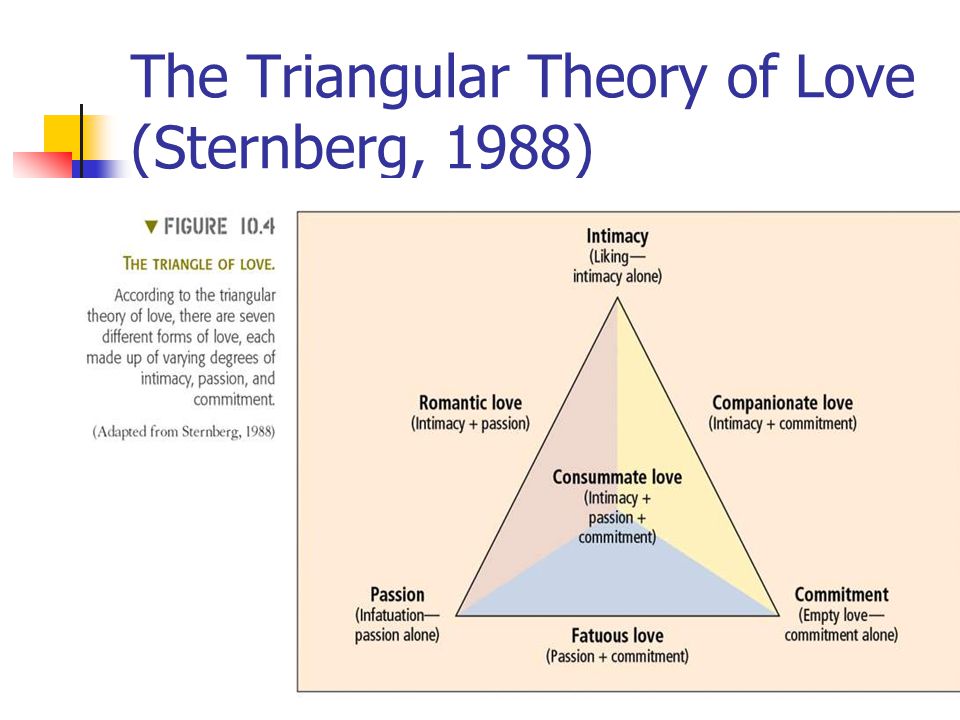 More often, love is called bodily craving for another person with sexual connotations, sometimes it is love, sometimes affection. They like to dream about true love, as about a high relationship between a man and a woman, in order to suddenly get it for themselves, in their lives, but rarely is anyone ready to learn to love, few are ready to invest in relationships so that they become relationships with love. nine0003
More often, love is called bodily craving for another person with sexual connotations, sometimes it is love, sometimes affection. They like to dream about true love, as about a high relationship between a man and a woman, in order to suddenly get it for themselves, in their lives, but rarely is anyone ready to learn to love, few are ready to invest in relationships so that they become relationships with love. nine0003
3Read more
Oct 01 2022
Fundamentals of Love
Love between a man and a woman, love as a living warm feeling and caring behavior, has a simple foundation: established relationships and choosing the right person.
1Read more
Jan 01 2011
Prevention of sick attachments
Attachments are good as long as you need each other and your attachments are not sick, soft, rather playful. If in a relationship your partner shows a tough, painful attachment to you, then this situation is dangerous. How to prevent such a relationship? What to do if such a person, nevertheless, turned out to be next to you? How to end such a relationship if it has already begun? nine0003
How to prevent such a relationship? What to do if such a person, nevertheless, turned out to be next to you? How to end such a relationship if it has already begun? nine0003
19Read more
Oct 01 2022
Dealing with attachment
Dealing with your own sick attachment according to the method of Steve and Connire Andreas.
1Read more
Oct 01 2022
Detachment
Beloved, your state is short-lived, not unique, not dangerous. If you don't make it yourself. If the best solution is to get rid of unhappy love, then we understand that the roots of the process are in neurosis (which one? - this is already independent), instinct, idleness. nine0003
1More
Love and affection in marital relations
Year of publication and journal number:
2008, №1
family”, held October 16-18, 2007 in Moscow. |
The important role of the family in human life is indisputable. Gone are the days when the choice of a marriage partner was made by the parents and relatives of a young man (girl). In today's society, most people choose to marry on their own. One of the motives for marriage and creating a family is love, the desire not to part with a loved one. Love, like family, is a universal human value. nine0003
The significance of these phenomena in human life is evidenced by numerous works of art and music, as well as the media, which periodically raise the problems of family, romantic relationships and love. Consequently, the problems of love and family are relevant for modern Russian society.
In domestic psychology there are few studies by Yu.E. Aleshina and L.Ya. Gozman (1986), E.P. Ilyin (2001), A.A. Kronik and E.A. Kronik (1989), S.V. Petrushina (2006), which touch upon some aspects of the problem of love in the context of marital relations. The main emphasis in these studies is on the development of relationships as such, and the feeling of love and its experience by a person for his spouse are practically not considered.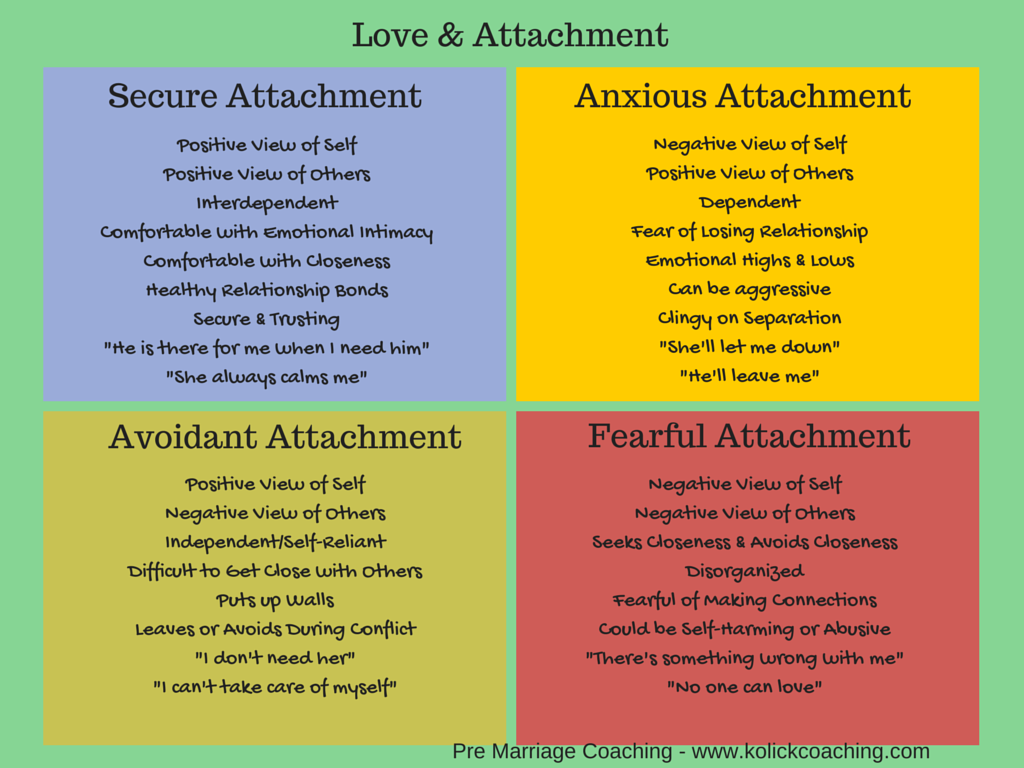
In our opinion, there is a need to study the love and romantic attachment of each spouse separately. Firstly, two unique personalities enter into marital relations, whose experiences cannot be considered identical to each other in any way, they are peculiar. Secondly, such an important aspect of marital relations as emotional is characterized by the presence of love and affection for a partner. nine0003
Love is a very multifaceted phenomenon (Z.Rubin, 1974; R.Sternberg, 1984; E.Bershid and D.Myers, 1997; P.Kutter, 1998). In this regard, in our study, we consider such components of it as romantic attachment and the style of loving a partner.
Based on the point of view of J. Bowlby, M. Ainsworth (according to Hocksma, Koomen, 1991), we understand attachment (attachment), as "a selective, affective relationship of a child with his mother, which organizes his behavior." According to the main thesis of J. Bowlby, the quality of a person's attachments in adulthood is largely a reflection of the quality of her previous attachments. The theoretical model of M. Ainsworth (1978), according to which the first educator plays a decisive role, it is on him that the emotional adaptation of the child depends. P.R.Shaver (1987) continued her research, but with respect to adults. According to his developments (according to: Bartholomew K., Horowitz L.M., 1991), romantic relationships in adults are based on three systems of behavior: 1) attachment - a loving feeling similar to that experienced by a child to his mother; 2) the desire to take care of another: lovers perceive each other as a child who needs care; 3) sex followed by sexual relations. This behavioral system can be included in romantic and marital relationships. K.A. Brennan and P.R. Shaver (1995) developed the Multi-Item Measure of Adult Romantic Attachment (MIMARA) methodology (Multi-Item Measure of Adult Romantic Attachment, translated by T.L. Kryukova, O.A. Ekimchik, 2005). In this questionnaire, the following characteristics of romantic attachment are highlighted: frustration, desire for intimacy, self-support, ambivalence, trust / confidence in a partner, jealousy / fear of losing relationships, “growth” of boundaries.
The theoretical model of M. Ainsworth (1978), according to which the first educator plays a decisive role, it is on him that the emotional adaptation of the child depends. P.R.Shaver (1987) continued her research, but with respect to adults. According to his developments (according to: Bartholomew K., Horowitz L.M., 1991), romantic relationships in adults are based on three systems of behavior: 1) attachment - a loving feeling similar to that experienced by a child to his mother; 2) the desire to take care of another: lovers perceive each other as a child who needs care; 3) sex followed by sexual relations. This behavioral system can be included in romantic and marital relationships. K.A. Brennan and P.R. Shaver (1995) developed the Multi-Item Measure of Adult Romantic Attachment (MIMARA) methodology (Multi-Item Measure of Adult Romantic Attachment, translated by T.L. Kryukova, O.A. Ekimchik, 2005). In this questionnaire, the following characteristics of romantic attachment are highlighted: frustration, desire for intimacy, self-support, ambivalence, trust / confidence in a partner, jealousy / fear of losing relationships, “growth” of boundaries.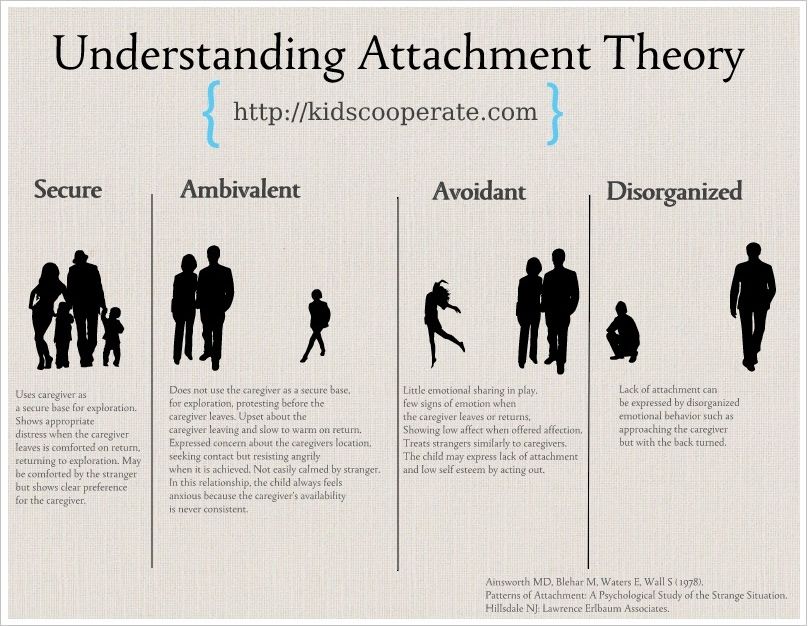 We tested this technique in our empirical study.
We tested this technique in our empirical study.
We have considered the style of love as a cognitive component of love. Under the style of love, we mean a combination of attitudes regarding love relationships and behavioral manifestations of feelings for a partner. In our study, we adhered to the classification of love styles proposed by J.A. Lee (1973–1976): “eros” - sensual love, “storge” - love-friendship, “ludus” - flirting, “pragma” - rational love, “ mania" - love-obsession, "agape" - selfless love. This typology is based on behavioral manifestations. H.Hendrick, S.Hendrick (1986) constructed scales to rate these love styles.
Emotional relationships between partners, after marriage, continue to develop and transform. Therefore, it is relevant to consider romantic attachment and love styles in marriage. At the same time, based on the theory of attachment by J. Bowlby, M. Ainsworth, P. Schweyr, it is less subject to change as a result of living together than the style of love.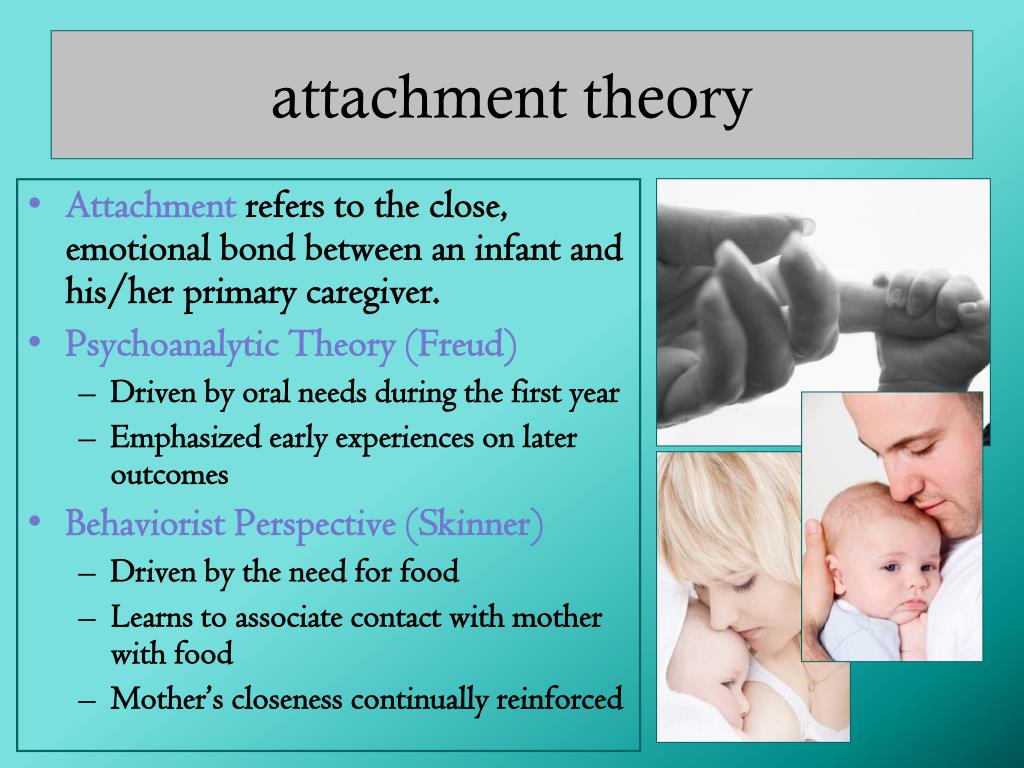 The cognitive attitudes of a person under the influence of various factors can change over time. nine0003
The cognitive attitudes of a person under the influence of various factors can change over time. nine0003
Based on the analysis of available research, we have an assumption that there is a relationship between the characteristics of the attachment of spouses to each other and between the styles of love of partners.
We conducted an empirical study of romantic attachment to a spouse and love styles (2007) in marriage. The sample consisted of 24 married couples (n=48), aged 20 to 58 years (mean age mf=31.5, mm=34.5).
After analyzing the obtained data, we obtained the following results. The less often a man expresses a depressed state from close relationships, the more often his wife experiences conflicting feelings towards him. This is confirmed by the negative relationship between the wife's ambivalence and the husband's frustration (r=-0.70 at p=0.002). If a woman has a well-expressed sense of “we” with her husband, then he is also less likely to experience depression and negative emotions from marital relations.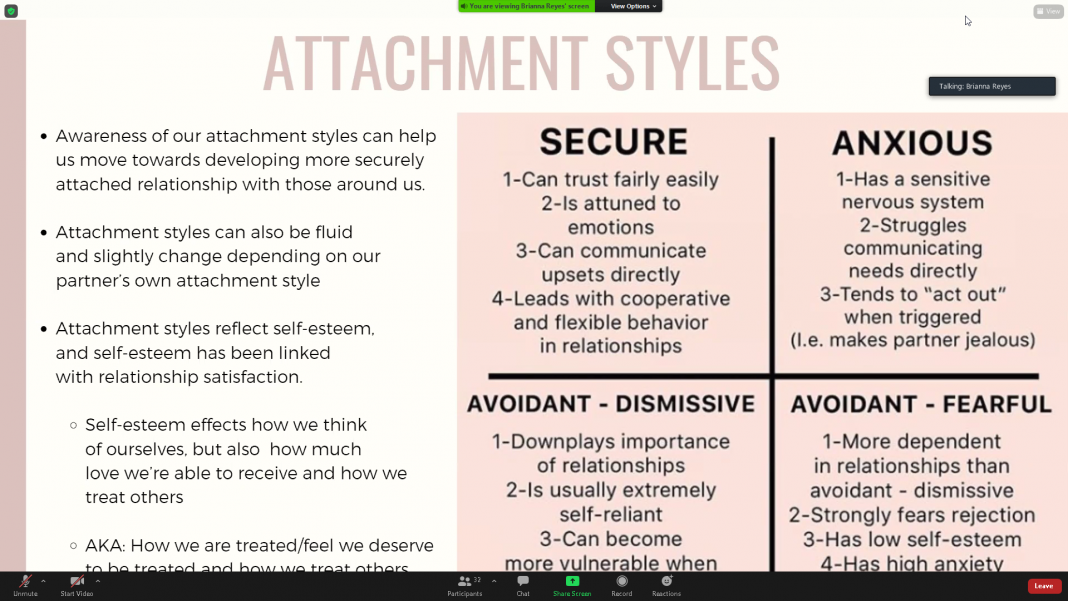 In this case, “growth” with the woman’s partner and the frustration of the man are associated (r=–0.55 p=0.02). nine0003
In this case, “growth” with the woman’s partner and the frustration of the man are associated (r=–0.55 p=0.02). nine0003
The more the husband strives for emotional intimacy, the better the wife is aware of their personal boundaries, which implies a greater likelihood of building harmonious relationships (r=-0.52 at p=0.03). The stronger the wife's depression in relationships, the fear of close relationships, the more the husband strives for intimacy, trust and openness in relationships, and to improve the condition of the spouse as well (r=0.53 at p=0.03). A wife's high level of frustration, even with her husband's desire for intimacy, can increase her insecurity and fears if she did not have a trusting and reliable relationship with her parents in childhood. nine0003
The stronger a husband's feelings of jealousy are, the less his wife trusts him. In this case, the woman shows protection: “if you don’t trust me, then why should I trust you” (r=-0.69 at p=0.002).
The more contradictory a woman's feelings for her husband, the less he distinguishes personal boundaries between them, the worse he understands her feelings for him.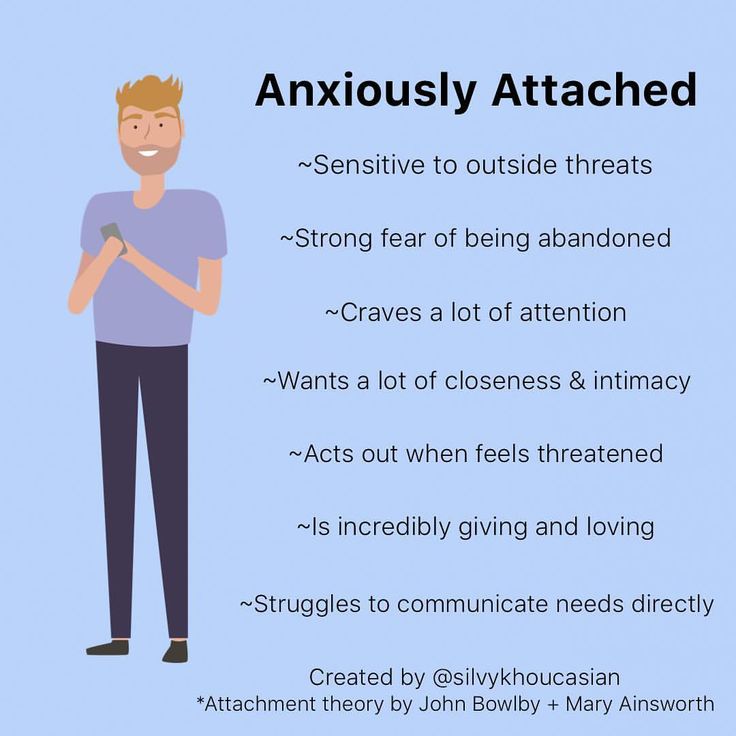 This can lead to a lack of understanding and confrontations or alienation on the part of the wife (r=0.62 at p=0.01).
This can lead to a lack of understanding and confrontations or alienation on the part of the wife (r=0.62 at p=0.01).
As a result of the correlation analysis, no reliably significant relationship was found between the same characteristics of the wife's and husband's romantic attachment. Consequently, the emotions and feelings of husband and wife in relation to each other differ in qualitative originality. nine0003
Thus, there is a connection between the attachment of spouses to each other, that is, the presence of some attachment components in the husband implies the presence or absence of others in the wife. The lack of links between identical characteristics of spouses' attachment is explained by the fact that the features of a person's emotional relationships are formed in relationships with parents in early childhood. At the same time, it must be taken into account that romantic attachment to a spouse, the ability to build emotional relationships are not always reflected by the personality itself. nine0003
nine0003
A more conscious aspect of love in marital relationships is the style of love. In the course of empirical research, we also found links between the styles of love of spouses. In marital relations, the severity of both the husband and the wife of such styles as sensual love (eros: r=0.52 at p=0.01), rational love (pragma: r=0.72 at p= 0.0001), love-obsession / passion, (mania: r=0.43 at p=0.04), selfless love, (agape: r=0.51 at p=0.01). Consequently, the stronger one of the listed styles of love is expressed in one of the spouses, the more the same style is manifested in the other. In this case, it can be argued that one of the listed styles of love dominates in marital relations among partners. There is a coordination of love styles in both partners, that is, cognitive attitudes regarding feelings for a partner in most cases coincide in marital relationships. nine0003
In addition, links were also found between different styles of love in spouses. If a man has an “easy” relationship to love, the desire to have relationships with several partners at once, the less his wife will experience a selfless feeling, frustrating her desires and needs for his sake (ludus and agape: r=-0.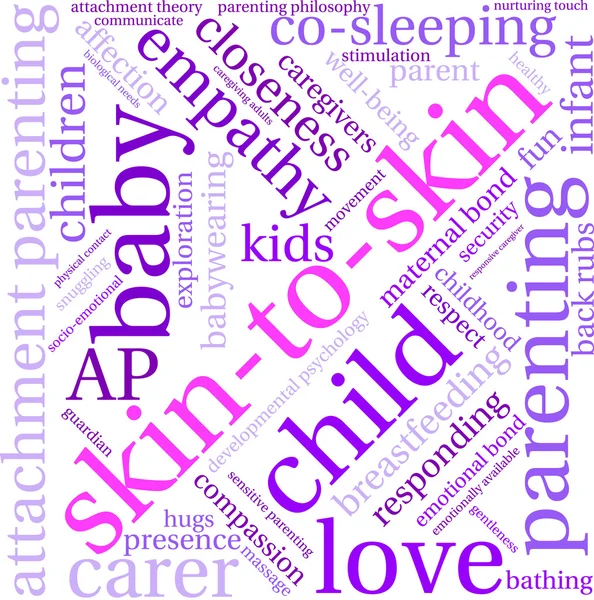 48 at p=0, 02). A man who loves with such love as a ludus is not capable of a deep relationship with a partner, he is puzzled only by his own pleasure, therefore the wife’s lack of desire to establish close, spiritual relationships is quite understandable, since they do not meet with understanding and encouragement on his part. nine0003
48 at p=0, 02). A man who loves with such love as a ludus is not capable of a deep relationship with a partner, he is puzzled only by his own pleasure, therefore the wife’s lack of desire to establish close, spiritual relationships is quite understandable, since they do not meet with understanding and encouragement on his part. nine0003
If a wife is very sensual, takes care of her appearance, strives to receive erotic pleasure in marital relations, then a man shows selflessness for her sake, is ready to sacrifice his own desires and aspirations for the sake of his beloved (eros and agape: r=0.71 at p=0 ,0002). Therefore, eros, or "earthly" feeling for the spouse is in harmony with spiritual love on his part, that is, agape.
In a marital relationship, there is consistency between cognitive attitudes and their behavioral manifestation of love in both partners. Such coordination, perhaps, on the one hand, is connected with the fact of cohabitation. On the other hand, the consistency of spouses' love styles can also be considered as one of the reasons for marriage and creating a family.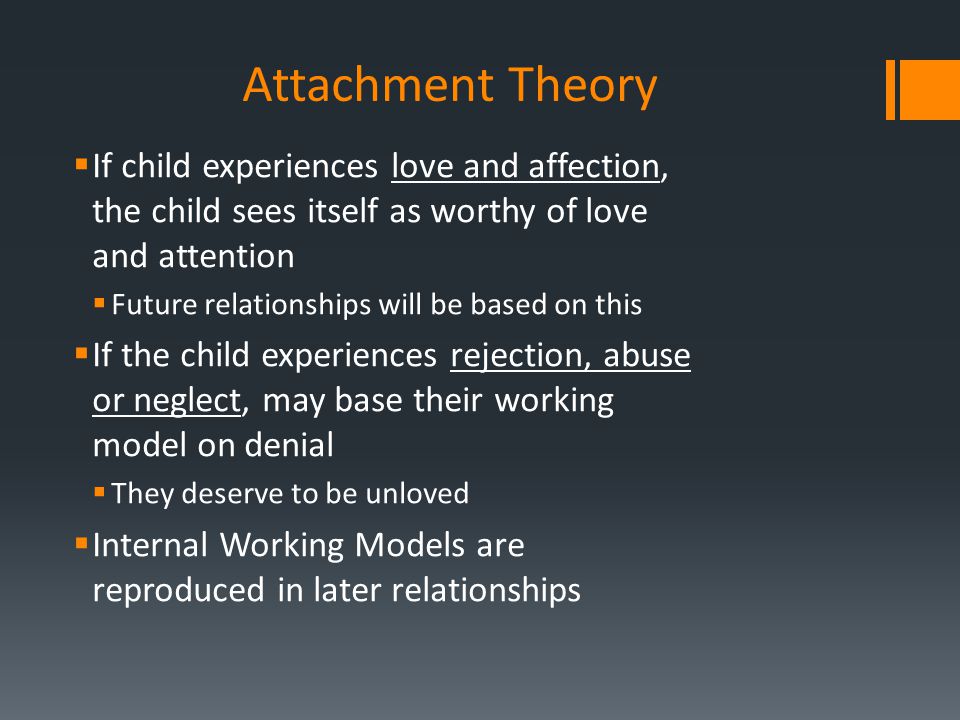 nine0003
nine0003
Thus, our assumption about the existence of a relationship between the characteristics of the attachment of spouses, as well as the styles of love of partners, was confirmed. There are connections between such characteristics of attachment as frustration, the desire for rapprochement, trust, jealousy and “growth” with a partner. However, no links were found between the same characteristics of attachment. Features of attachment, manifested in marital relations, are formed in a person on the basis of relations with parents. This gives originality and individuality to the emotional aspect of each of the partners in the marriage relationship. The reasons for certain features of emotional relations by spouses in most cases are not recognized, and they can either strengthen the marriage as a whole, or cause misunderstanding and conflicts. nine0003
There are links of love styles that are identical in both spouses, as well as opposite ones, for example, eros and agape. Consequently, the cognitive component of love, that is, style, is more consistent in marital relationships among partners and can change over time.



